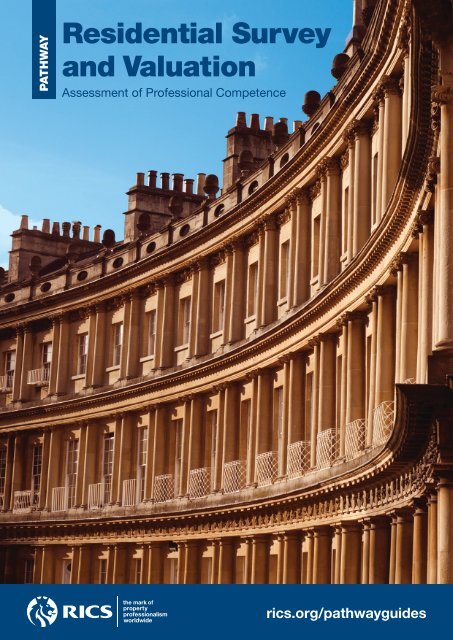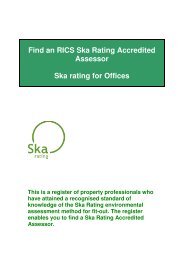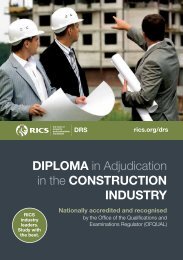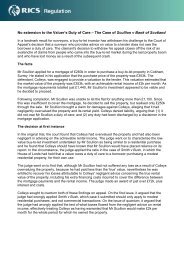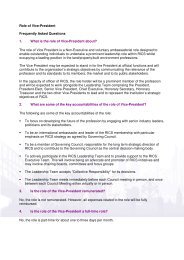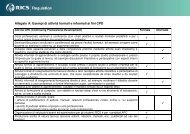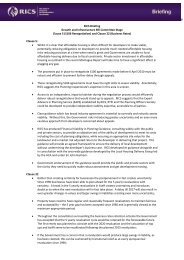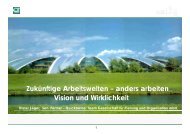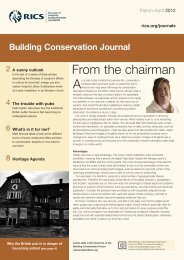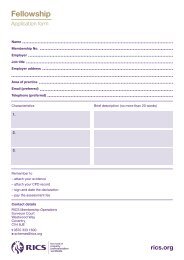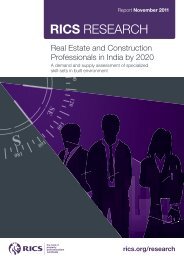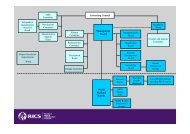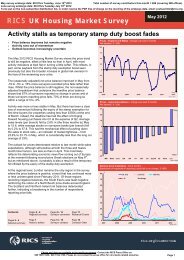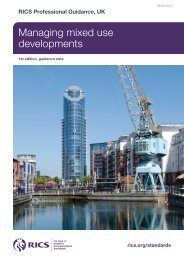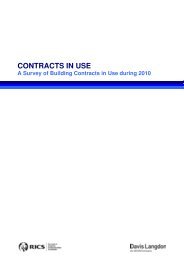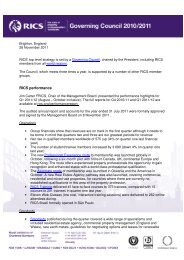Pathway guide: Residential Survey and Valuation - RICS
Pathway guide: Residential Survey and Valuation - RICS
Pathway guide: Residential Survey and Valuation - RICS
You also want an ePaper? Increase the reach of your titles
YUMPU automatically turns print PDFs into web optimized ePapers that Google loves.
<strong>Residential</strong> <strong>Survey</strong><br />
<strong>and</strong> <strong>Valuation</strong><br />
Assessment of Professional Competence<br />
rics.org/pathway<strong>guide</strong>s
Published by: <strong>RICS</strong>, Parliament Square, London SW1P 3AD<br />
All rights in this publication, including full copyright or publishing right, content <strong>and</strong> design, are owned by <strong>RICS</strong>,<br />
except where otherwise described. Any dispute arising out of this publication is subject to the law <strong>and</strong> jurisdiction<br />
of Engl<strong>and</strong> <strong>and</strong> Wales.<br />
02<br />
RESIDENTIAL SURVEY AND VALUATION
Contents<br />
Introduction 04<br />
<strong>Pathway</strong> requirements 07<br />
<strong>Residential</strong> <strong>Survey</strong> <strong>and</strong> <strong>Valuation</strong> APC 07<br />
Competency guidance 08<br />
Auctioneering 09<br />
Building pathology (T006) 10<br />
Capital taxation (T009) 11<br />
Compulsory purchase <strong>and</strong> compensation (T011) 12<br />
Conflict avoidance, management <strong>and</strong> dispute resolution procedures (M006) 13<br />
Contaminated l<strong>and</strong> (T015) 15<br />
Environmental assessment (T028) 16<br />
Housing aid or advice (T038) 17<br />
Housing maintenance, repairs <strong>and</strong> improvements (T039) 18<br />
Housing management <strong>and</strong> policy (T040) 19<br />
Housing strategy <strong>and</strong> provision (T041) 20<br />
Indirect investment vehicles (T043) 21<br />
Inspection (T044) 22<br />
Investment management (including fund <strong>and</strong> portfolio management) (T046) 23<br />
L<strong>and</strong>lord <strong>and</strong> tenant (including rent reviews <strong>and</strong> lease renewals) (T048) 24<br />
L<strong>and</strong> use <strong>and</strong> diversification (T049) 25<br />
Leasing/letting (T050) 26<br />
Local taxation/assessment (T052) 27<br />
Maintenance management (T053) 28<br />
Measurement of l<strong>and</strong> <strong>and</strong> property (T057) 29<br />
Planning (T061) 30<br />
Property finance <strong>and</strong> funding (T069) 31<br />
Property management (T070) 32<br />
Property management accounting (T071) 33<br />
Property records/information systems (T072) 34<br />
Purchase <strong>and</strong> sale (T073) 35<br />
Sustainability (M009) 36<br />
<strong>Valuation</strong> (T083) 37<br />
RESIDENTIAL SURVEY AND VALUATION 03
Introduction<br />
About the APC<br />
The <strong>RICS</strong> Assessment of Professional Competence (APC)<br />
ensure that those applying for <strong>RICS</strong> membership are<br />
competent to practise <strong>and</strong> meet the high st<strong>and</strong>ards of<br />
professionalism required by <strong>RICS</strong>. There is a wide range<br />
of pathways available to qualify as an <strong>RICS</strong> member covering<br />
22 different areas of practice.<br />
The APC normally consist of:<br />
• a period of structured training<br />
• a final assessment.<br />
The structured training is based on c<strong>and</strong>idates achieving a set<br />
of requirements or competencies. These are a mix of technical,<br />
professional, interpersonal, business <strong>and</strong> management skills.<br />
How to use this <strong>guide</strong><br />
This <strong>guide</strong> supports the core 2006 APC documentation. It is<br />
designed to help you underst<strong>and</strong> more about qualifying as<br />
an <strong>RICS</strong> member in residential survey <strong>and</strong> valuation. The <strong>guide</strong><br />
is based on UK market practice <strong>and</strong> may be unsuitable for<br />
c<strong>and</strong>idates based in other countries. The material is set out<br />
in three sections.<br />
Section one – provides information on this area of<br />
practice with a general overview of the residential survey<br />
<strong>and</strong> valuation pathways.<br />
Section two – lists the competency requirements of the<br />
residential survey <strong>and</strong> valuation APC pathways (as set out in<br />
the APC Requirements <strong>and</strong> competencies <strong>guide</strong><br />
– February 2012).<br />
Section three – describes the main technical competencies<br />
associated with residential survey <strong>and</strong> valuation providing<br />
exp<strong>and</strong>ed sector specific guidance on each of them. This<br />
forms the main part of the <strong>guide</strong>.<br />
04<br />
RESIDENTIAL SURVEY AND VALUATION<br />
You MUST use this <strong>guide</strong> in conjunction with the 2006<br />
core APC documentation which is available on the <strong>RICS</strong><br />
website <strong>and</strong> comprises:<br />
• APC Requirements <strong>and</strong> competencies <strong>guide</strong><br />
– February 2012.<br />
• C<strong>and</strong>idate <strong>guide</strong>s (2006) – (the particular c<strong>and</strong>idate<br />
<strong>guide</strong> you need will depend on your route to membership).<br />
• Guide for supervisors, counsellors <strong>and</strong> employers<br />
– graduate route to membership, July 2006.
Introduction<br />
About the competencies<br />
The APC aims to assess that you are competent to carry<br />
out the work of a qualified chartered surveyor. To be<br />
competent is to have the skill or ability to perform a task<br />
or function. The <strong>RICS</strong> competencies are not just a list of<br />
tasks or functions, they are also based upon attitudes <strong>and</strong><br />
behaviours. The competencies have been drawn up in a<br />
generic way so that they can be applied to different areas<br />
of practice <strong>and</strong> geographical locations. This <strong>guide</strong> is<br />
designed to help you interpret these competencies within<br />
the context of residential survey <strong>and</strong> valuation.<br />
The competencies are defined at three levels of attainment<br />
<strong>and</strong> each APC pathway has its own specific combination of<br />
competencies that you must achieve at the appropriate level.<br />
You must reach the required level in a logical progression<br />
<strong>and</strong> in successive stages:<br />
Level 1 – knowledge <strong>and</strong> underst<strong>and</strong>ing<br />
Level 2 – application of knowledge <strong>and</strong> underst<strong>and</strong>ing<br />
Level 3 – reasoned advice <strong>and</strong> depth of technical knowledge.<br />
The competencies are in three distinct categories:<br />
M<strong>and</strong>atory competencies – the personal, interpersonal,<br />
professional practice <strong>and</strong> business competencies common<br />
to all pathways <strong>and</strong> compulsory for all c<strong>and</strong>idates. These<br />
are explained in more detail in the APC Requirements <strong>and</strong><br />
competencies <strong>guide</strong> – February 2012..<br />
Core competencies – the primary competencies of your<br />
chosen APC pathway.<br />
Optional competencies – a set of competencies selected by<br />
the c<strong>and</strong>idate from a list defined for the particular pathway. In<br />
most cases there is an element of choice. These are mostly<br />
technical competencies, but certain m<strong>and</strong>atory competencies<br />
also appear on the optional competency list <strong>and</strong> c<strong>and</strong>idates<br />
are permitted to select one of these at a higher level.<br />
This <strong>guide</strong> only deals with the principal core <strong>and</strong> optional<br />
competencies associated with this area. It does not cover<br />
the m<strong>and</strong>atory competencies.<br />
Choosing your competencies<br />
It is important that you give careful thought to your choice<br />
<strong>and</strong> combination of competencies. Your choice will inevitably<br />
reflect the work you do in your day-to-day environment<br />
(driven by the needs of your clients/employer). Your choice<br />
<strong>and</strong> combination of competencies will be a reflection of your<br />
judgement. At final assessment, the assessors will take these<br />
choices into account. They will expect you to present a sensible<br />
<strong>and</strong> realistic choice that reflects the skills needed to fulfil the<br />
role of a surveyor in your field of practice.<br />
This <strong>guide</strong> should help c<strong>and</strong>idates <strong>and</strong> employers with a<br />
degree of assistance in choosing the competencies that are<br />
most appropriate to their area of practice.<br />
How to find help<br />
<strong>RICS</strong> has a fully trained Contact Centre team who will be able<br />
to help you with any general APC queries:<br />
<strong>RICS</strong> HQ<br />
Parliament Square<br />
London SW1P 3AD<br />
United Kingdom<br />
t +44 (0)870 333 1600<br />
f +44 (0)20 7334 3811<br />
contactrics@rics.org<br />
www.rics.org<br />
RESIDENTIAL SURVEY AND VALUATION 05
Introduction<br />
About <strong>Residential</strong> survey <strong>and</strong> valuation<br />
<strong>Residential</strong> property plays a vitally important role in society.<br />
In addition to its primary purpose of meeting the housing<br />
requirements of the population it is also a growing investment<br />
asset class.<br />
<strong>Residential</strong> survey <strong>and</strong> valuation is a key professional service<br />
supporting the transaction <strong>and</strong> ownership of property. Above<br />
all, <strong>RICS</strong> members working in this area provide a vital link in<br />
the homebuying process.<br />
<strong>Survey</strong>s <strong>and</strong> valuations of residential property combine property<br />
market expertise with an underst<strong>and</strong>ing of buildings. These<br />
two distinct but connected areas of competence are core to<br />
the work of professionals in this area, who are appointed to<br />
advise on the market <strong>and</strong> condition of a property.<br />
Mortgage lending decisions rely on the advice of qualified<br />
valuers. Although IT is playing a more <strong>and</strong> more important role<br />
in this area, professional advice is set to remain crucial to<br />
lenders. A number of <strong>RICS</strong> members in this area also work<br />
within lending institutions to provide management of valuation<br />
service provision.<br />
<strong>RICS</strong> qualification pathways in this sector:<br />
<strong>Residential</strong> <strong>Survey</strong> <strong>and</strong> <strong>Valuation</strong> APC<br />
The <strong>Residential</strong> <strong>Survey</strong> <strong>and</strong> <strong>Valuation</strong> APC pathway is similar<br />
to the <strong>Residential</strong> Property Practice APC, but focuses more<br />
on providing advice on the condition of property <strong>and</strong> the<br />
assessment of property (for loan security purposes) which<br />
forms a fundamental part of this work.<br />
<strong>RICS</strong> also offers a <strong>Residential</strong> survey <strong>and</strong> valuation pathway<br />
in its Associate qualification.<br />
For further details on Associate membership <strong>and</strong> this<br />
pathway please go to rics.org/associate<br />
06<br />
RESIDENTIAL SURVEY AND VALUATION
<strong>Pathway</strong> requirements<br />
<strong>Residential</strong> <strong>Survey</strong> <strong>and</strong> <strong>Valuation</strong> APC<br />
M<strong>and</strong>atory competencies<br />
You must achieve the minimum levels as set out in the<br />
m<strong>and</strong>atory competencies.<br />
Core competencies<br />
Level 3<br />
• Building pathology (T006)<br />
• Inspection (T044)<br />
Level 2<br />
• Measurement of l<strong>and</strong> <strong>and</strong> property (T057)<br />
• <strong>Valuation</strong> (T083) (or Level 3*)<br />
Optional competencies<br />
One competency to Level 3 <strong>and</strong> two competencies to<br />
Level 2* from the list below.<br />
• Auctioneering (T004)<br />
• Capital taxation (T009)<br />
• Compulsory purchase <strong>and</strong> compensation (T011)<br />
• Contaminated l<strong>and</strong> (T015)<br />
• Environmental assessment (T028)<br />
• Housing aid or advice (T038)<br />
• Housing maintenance, repairs <strong>and</strong> improvements (T039)<br />
• Housing management <strong>and</strong> policy (T040)<br />
• Housing strategy <strong>and</strong> provision (T041)<br />
• Indirect investment vehicles (T043)<br />
• Investment management (including fund <strong>and</strong> portfolio<br />
management) (T046)<br />
• L<strong>and</strong>lord <strong>and</strong> tenant (including rent reviews <strong>and</strong> lease<br />
renewals) (T048)<br />
• L<strong>and</strong> use <strong>and</strong> diversification (T049)<br />
• Leasing/letting (T050)<br />
• Local taxation/assessment (T052)<br />
• Maintenance management (T053)<br />
• Planning (T061)<br />
• Property finance <strong>and</strong> funding (T069)<br />
• Property management (T070)<br />
• Property management accounting (T071)<br />
• Property records/information systems (T072)<br />
• Purchase <strong>and</strong> sale (T073)<br />
• Conflict avoidance, management <strong>and</strong> dispute resolution<br />
procedures (M006) or Sustainability (M009)<br />
Plus one competency to Level 2 from the full list of technical<br />
competencies, including any not already chosen from the<br />
list above.<br />
Notes: *If <strong>Valuation</strong> is taken as a Level 3 core competency<br />
then the optional competency requirements are three<br />
competencies to Level 2 plus one competency to Level 2<br />
from the full list of technical competencies, including any<br />
not already chosen from the list above.<br />
RESIDENTIAL SURVEY AND VALUATION 07
Competency <strong>guide</strong><br />
The pages that follow are intended to provide guidance for<br />
users on the main competencies associated with residential<br />
survey <strong>and</strong> valuation.<br />
The guidance has been drawn up by experienced practitioners<br />
<strong>and</strong> aims to give you a clear <strong>and</strong> practical underst<strong>and</strong>ing of<br />
how to apply the listed core <strong>and</strong> optional competencies in the<br />
context of residential survey <strong>and</strong> valuation. The guidance does<br />
not cover the m<strong>and</strong>atory competency requirements.<br />
The official competency definitions (at levels one, two <strong>and</strong><br />
three) are provided, followed by a description of the key<br />
knowledge <strong>and</strong> activities that are likely to fall within the scope<br />
of each competency.<br />
The information provided is designed to be helpful but informal<br />
guidance. The knowledge <strong>and</strong> activities described under each<br />
competency are not exhaustive, <strong>and</strong> should not be relied upon<br />
as any form of revision list. C<strong>and</strong>idates must satisfy themselves<br />
<strong>and</strong> their employers that they have reached the required level<br />
of attainment before applying for final assessment.<br />
The competencies are arranged in alphabetical order.<br />
The full list of <strong>RICS</strong> competencies <strong>and</strong> pathway requirements<br />
can be found in the APC Requirements <strong>and</strong> competencies <strong>guide</strong><br />
– February 2012.<br />
08 RESIDENTIAL SURVEY AND VALUATION<br />
8
Competency <strong>guide</strong><br />
Auctioneering<br />
Reference no. T004<br />
Description of competency in context of this sector<br />
This competency reflects the complex factors governing auctioneering. It includes aspects of law of<br />
sale <strong>and</strong> contract, misdescription etc, as well as requiring the c<strong>and</strong>idate to have knowledge of the<br />
auction process <strong>and</strong> the reasons for recommending sale by auction (or otherwise) over <strong>and</strong> above<br />
other methods of disposal.<br />
Examples of likely knowledge, skills <strong>and</strong> experience at each level<br />
Level 1<br />
Demonstrate knowledge <strong>and</strong> underst<strong>and</strong>ing<br />
of the basic principles <strong>and</strong> legal obligations<br />
of auction. This should include preparation for,<br />
<strong>and</strong> procedures prior to or during, an auction.<br />
Examples of knowledge comprised within<br />
this level are:<br />
• The principles of the law governing auction<br />
<strong>and</strong> its implications<br />
• An underst<strong>and</strong>ing of the process of how an<br />
auction works, including an underst<strong>and</strong>ing of<br />
the information required prior to auction <strong>and</strong><br />
the process on the day.<br />
Level 2<br />
Provide evidence of the practical application<br />
of your knowledge to the preparation for the<br />
sale of property at auction <strong>and</strong> procedures<br />
prior to or during an auction.<br />
Examples of activities <strong>and</strong> knowledge<br />
comprised within this level are:<br />
• Compiling information relating to property to<br />
be sold at auction<br />
• Assisting in the process of drawing up<br />
auction catalogues<br />
• Dealing with queries <strong>and</strong> issues raised prior<br />
to the auction in consultation with others<br />
• Dealing with issues arising post auction in<br />
consultation with others.<br />
Level 3<br />
Provide evidence of reasoned advice based<br />
on a thorough working knowledge <strong>and</strong><br />
experience of the auction process, including<br />
experience of selling at auction.<br />
Examples of activities <strong>and</strong> knowledge<br />
comprised within this level are:<br />
• Advising clients on the suitability of sale<br />
by auction<br />
• Attending an auction <strong>and</strong> selling lots<br />
• Dealing with a sale by auction from start<br />
to completion.<br />
RESIDENTIAL SURVEY AND VALUATION 09
Competency <strong>guide</strong><br />
Building pathology<br />
Reference no. T006<br />
Description of competency in context of this sector<br />
Building pathology is core to competently undertaking surveys of residential property. This competency requires<br />
an underst<strong>and</strong>ing of defects analysis, <strong>and</strong> the likely defects arising from failures in building fabric. This will range<br />
from the effects of a defective waterproof covering at simple building pathology, to much more complex defects<br />
such as interstitial condensation, <strong>and</strong> the possible effects on building fabric. C<strong>and</strong>idates will be expected to have<br />
an in-depth knowledge/experience of the range of defects found in typical residential buildings in their locality,<br />
as well as an underst<strong>and</strong>ing of defects that they may come across more infrequently. In order to be competent<br />
in building pathology <strong>and</strong> defects analysis c<strong>and</strong>idates will need to have knowledge of construction technology.<br />
Examples of likely knowledge, skills <strong>and</strong> experience at each level<br />
Level 1<br />
Demonstrate your knowledge <strong>and</strong><br />
underst<strong>and</strong>ing of building defects including<br />
collection of information, measurements<br />
<strong>and</strong> tests.<br />
Examples of knowledge comprised within<br />
this level are:<br />
• Knowledge <strong>and</strong> underst<strong>and</strong>ing of the various<br />
types of survey that may be required<br />
• Knowledge <strong>and</strong> underst<strong>and</strong>ing of typical<br />
defects relating to typical residential<br />
buildings found in your locality, you may<br />
have come across <strong>and</strong> explain cause <strong>and</strong><br />
effect of these<br />
• Knowledge <strong>and</strong> underst<strong>and</strong>ing of building<br />
defects likely to be encountered in typical<br />
building surveying activities<br />
• Knowledge <strong>and</strong> underst<strong>and</strong>ing of the various<br />
methods to collect, store <strong>and</strong> retrieve<br />
information for various differing purposes<br />
when carrying out property inspections<br />
• The importance of the accurate recording<br />
of information during inspection<br />
• Knowledge <strong>and</strong> underst<strong>and</strong>ing of differing<br />
types of testing, <strong>and</strong> the limitations of the<br />
tests, for example the use of damp meters,<br />
<strong>and</strong> other relevant equipment.<br />
Level 2<br />
10 RESIDENTIAL SURVEY AND VALUATION<br />
Apply your knowledge to undertake<br />
surveys, use survey <strong>and</strong> other information<br />
to diagnose cause <strong>and</strong> mechanisms<br />
of failure.<br />
Examples of activities <strong>and</strong> knowledge<br />
comprised within this level are:<br />
• Using examples, from your own experience,<br />
to demonstrate your application of knowledge<br />
gained at Level 1<br />
• Explaining the cause <strong>and</strong> mechanics of<br />
varying types of failure<br />
• Carrying out inspections of properties<br />
• Explaining, with use of detailed examples,<br />
the relationship between observations taken<br />
on site <strong>and</strong> the diagnosis of failure in<br />
building fabric<br />
• Using knowledge <strong>and</strong> information gathered<br />
from several sources, including if necessary<br />
specialist inspections, to diagnose <strong>and</strong><br />
explain building fabric failure.<br />
Level 3<br />
Provide evidence of reasoned advice <strong>and</strong><br />
appropriate recommendations, including<br />
the preparation <strong>and</strong> presentation of reports.<br />
Examples of activities <strong>and</strong> knowledge<br />
comprised within this level are:<br />
• Preparing reports for clients, explaining in non<br />
technical language the causes of failure, <strong>and</strong><br />
the likely results of failure, together with the<br />
appropriate remedial measures<br />
• Using information gathered from inspections to<br />
formulate the necessary remedial/preventative<br />
works including specific detail, in the form of a<br />
schedule of works, if required. In the case of<br />
c<strong>and</strong>idates on a residential property pathway<br />
this will usually involve referring specialist work<br />
on to the relevant specialists<br />
• An underst<strong>and</strong>ing of the appropriate level of<br />
detail required in typical reports, including<br />
examples of layout, <strong>and</strong> the use of sketches/<br />
drawings <strong>and</strong> photographs<br />
• Discussing in detail examples of unusual<br />
defects you have been involved in <strong>and</strong><br />
remedial works employed<br />
• Explaining the role of different types of report<br />
<strong>and</strong> how they meet the needs of clients, (for<br />
example the differences between, mortgage<br />
valuations, homebuyer surveys, building<br />
surveys, defect reports etc).
Competency <strong>guide</strong><br />
Capital taxation<br />
Reference no. T009<br />
Description of competency in context of this sector<br />
TThis competency includes valuations <strong>and</strong> negotiations for inheritance tax, capital gains tax, which<br />
may also include advising on stamp duty, <strong>and</strong> advising on litigation. It involves measurement of <strong>and</strong><br />
analysis of comparables <strong>and</strong> application of evidence to resolve negotiations. It also includes<br />
application of statute <strong>and</strong> case law.<br />
Examples of likely knowledge, skills <strong>and</strong> experience at each level<br />
Level 1<br />
Demonstrate knowledge <strong>and</strong> underst<strong>and</strong>ing<br />
of the relevant provisions for capital taxation<br />
of real estate, equipment <strong>and</strong>/or<br />
other property.*<br />
Examples of knowledge comprised within<br />
this level are:<br />
• Principles of measurement (including Code<br />
of measuring practice)<br />
• Application of statute <strong>and</strong> case law<br />
• Analysis of evidence <strong>and</strong> relevance of the law<br />
of l<strong>and</strong>lord <strong>and</strong> tenant<br />
• Knowledge of valuation methods appropriate<br />
to residential property taxation.<br />
Level 2<br />
Undertake valuations <strong>and</strong> negotiations<br />
for a variety of different property types using<br />
different valuation methods for the purposes<br />
of capital taxation.<br />
Examples of activities <strong>and</strong> knowledge<br />
comprised within this level are:<br />
• Undertaking measurement <strong>and</strong> inspection<br />
• Undertaking valuation of a variety of<br />
residential properties<br />
• Using appropriate methods of valuation<br />
including use of comparables<br />
• Negotiating valuations <strong>and</strong> settlement<br />
of cases.<br />
Level 3<br />
Provide evidence of reasoned advice to<br />
stakeholders (to include senior management<br />
within your organisation, clients <strong>and</strong> courts/<br />
tribunal members) in respect of specific<br />
cases <strong>and</strong>/or other capital taxation issues.<br />
Examples of activities <strong>and</strong> knowledge<br />
comprised within this level are:<br />
• Advising on settlement or litigation of cases<br />
• Advising on the costs of options <strong>and</strong> actions<br />
• Advising on the impact of such actions across<br />
the wider arena.<br />
RESIDENTIAL SURVEY AND VALUATION<br />
11
Competency <strong>guide</strong><br />
Compulsory purchase <strong>and</strong> compensation<br />
Reference no. T011<br />
Description of competency in context of this sector<br />
The underst<strong>and</strong>ing <strong>and</strong> practical application, within the appropriate legal framework, of compulsory<br />
purchase powers. Including the assessment of <strong>and</strong> claim for compensation. The c<strong>and</strong>idate is expected<br />
to have an underst<strong>and</strong>ing from both the acquiring authority <strong>and</strong> claimant’s position.<br />
Examples of likely knowledge, skills <strong>and</strong> experience at each level<br />
Level 1<br />
Demonstrate knowledge <strong>and</strong> underst<strong>and</strong>ing<br />
of the powers <strong>and</strong> procedures of government<br />
<strong>and</strong> other bodies in relation to the compulsory<br />
purchase <strong>and</strong> compensation. This should<br />
cover interests in real estate <strong>and</strong> of the rights<br />
of owners <strong>and</strong> occupiers of the various<br />
interests in property.<br />
Examples of knowledge comprised within<br />
this level are:<br />
• The historical background, requirement for<br />
<strong>and</strong> justification of the use of compulsory<br />
purchase powers<br />
• An overview of the various Acts of Parliament<br />
covering acquisition of l<strong>and</strong> <strong>and</strong> rights, planning<br />
<strong>and</strong> compensation<br />
• The basic principles of compensation (the<br />
before <strong>and</strong> after principle), accommodation<br />
works, betterment, equivalence <strong>and</strong> the legal<br />
right to claim.<br />
Level 2<br />
12 RESIDENTIAL SURVEY AND VALUATION<br />
Assist in the preparation of the various<br />
stages involved in the process of compulsory<br />
purchase including the estimation of a<br />
claim for compensation.<br />
Examples of activities <strong>and</strong> knowledge<br />
comprised within this level are:<br />
• Outlining the stages <strong>and</strong> timing involved in<br />
making, confirming <strong>and</strong> implementing a<br />
compulsory purchase order<br />
• An underst<strong>and</strong>ing of statutory abilities to<br />
acquire rights other than outright purchase,<br />
such as those exercised by utilities companies<br />
• Setting out heads of claim under a<br />
compensation claim<br />
• Being aware of <strong>and</strong> using appropriately<br />
the relevant statutory <strong>and</strong> case law in the<br />
assessment of a claim for compensation.<br />
Level 3<br />
Provide evidence of reasoned advice in<br />
relation to the validity <strong>and</strong> level of a claim<br />
for compensation, using a variety of<br />
valuation methodologies appropriate for<br />
the circumstances of the claim. Take an<br />
active role in the negotiation of claims,<br />
using a variety of bases of statutory <strong>and</strong><br />
other valuation methodologies. Provide<br />
reasoned advice on the role of compulsory<br />
purchase in facilitating planning <strong>and</strong><br />
regeneration initiatives.<br />
Examples of activities <strong>and</strong> knowledge<br />
comprised within this level are:<br />
• Supplying <strong>and</strong> justifying evidence for a<br />
statement of claim using both valuation <strong>and</strong><br />
logical techniques to back up the quantum<br />
of the claim<br />
• Dealing with best practice in the<br />
implementation of a compulsory purchase<br />
order on say a road scheme<br />
• Developing a rationale for the use of<br />
compulsory purchase powers in order to<br />
enable development, taking into account<br />
human rights legislation<br />
• Being aware of the fee basis for chartered<br />
surveyors <strong>and</strong> the role of the L<strong>and</strong>s Tribunal<br />
as well as mediation/arbitration<br />
• Assisting in the preparation for <strong>and</strong><br />
attendance at a Public Inquiry into a<br />
Compulsory Purchase Order including<br />
underst<strong>and</strong>ing of procedure <strong>and</strong> process.
Competency <strong>guide</strong><br />
Conflict avoidance, management<br />
<strong>and</strong> dispute resolution procedures<br />
Reference no. M006<br />
Description of competency in context of this sector<br />
This competency covers knowledge, underst<strong>and</strong>ing <strong>and</strong> application of a range<br />
of processes related to dispute/conflict avoidance, management <strong>and</strong> dispute resolution.<br />
Examples of likely knowledge, skills <strong>and</strong> experience at each level<br />
Level 1<br />
Demonstrate knowledge <strong>and</strong> underst<strong>and</strong>ing<br />
of the techniques for conflict avoidance,<br />
conflict management <strong>and</strong> dispute resolution<br />
procedures including for example adjudication<br />
<strong>and</strong> arbitration, appropriate to your<br />
APC pathway.<br />
Examples of knowledge comprised within<br />
this level are:<br />
A basic knowledge <strong>and</strong> underst<strong>and</strong>ing of some<br />
of the following, as most appropriate to your<br />
market sector/areas of specialism:<br />
• Common causes of disputes<br />
• The contribution of some of the following to<br />
dispute avoidance:<br />
- Risk management – its basic principles<br />
<strong>and</strong> techniques<br />
- Early warning systems<br />
- Partnering techniques<br />
- Clear <strong>and</strong> robust client briefings.<br />
• Theories of negotiation <strong>and</strong> the role of<br />
effective communication <strong>and</strong> negotiation<br />
• The primary features, advantages <strong>and</strong><br />
disadvantages of a range of dispute resolution<br />
procedures <strong>and</strong> their surrounding statutory<br />
<strong>and</strong>/or non-statutory legal/judicial context<br />
(eg how forms of contract deal with dispute<br />
resolution, <strong>and</strong> the scope of such clauses):<br />
- Mediation (could include contracted <strong>and</strong><br />
project mediation) <strong>and</strong> conciliation<br />
Level 2<br />
Provide evidence of practical application in<br />
your area of practice having regard to the<br />
relevant law.<br />
Examples of activities <strong>and</strong> knowledge<br />
comprised within this level are:<br />
• Advising clients of the most suitable means<br />
of dispute avoidance on their projects, <strong>and</strong><br />
of dispute resolution procedures appropriate<br />
to their individual circumstances,<br />
demonstrating appreciation of when to seek<br />
further specialist advice <strong>and</strong> when to advise<br />
clients within the scope of the P.I. cover of<br />
the c<strong>and</strong>idate’s organization<br />
• Adopting - or encouragement of the<br />
adoption of (as appropriate) – suitable dispute<br />
avoidance techniques<br />
• Negotiating actively on behalf of clients (e.g.<br />
negotiations of a dilapidations claim, a party<br />
wall award or final account on a construction<br />
project) prior to third party referral<br />
• Assisting in the collation or preparation of<br />
claims/counter-claims <strong>and</strong> submissions<br />
• Assisting in the identification, gathering <strong>and</strong><br />
collation of facts <strong>and</strong> expert evidence for use<br />
in expert reports<br />
Level 3<br />
Provide evidence of the application of the<br />
above in the context of advising clients in the<br />
various circumstances referred to above.<br />
Examples of activities <strong>and</strong> knowledge<br />
comprised within this level are:<br />
• Involvement in, or assistance with, a referral<br />
to a 3rd party resolution process <strong>and</strong><br />
associated management of that process on<br />
behalf of client<br />
• NB: Please note that the roles of acting as a<br />
3rd party dispute resolver, expert witness, or<br />
advocate, are – for the vast majority of APC<br />
c<strong>and</strong>idates – not likely to be an activity that is<br />
undertaken. It is only a small minority of<br />
c<strong>and</strong>idates with substantive work experience<br />
for whom this is likely to be relevant.<br />
continued on next page><br />
RESIDENTIAL SURVEY AND VALUATION<br />
13
Competency <strong>guide</strong><br />
Conflict avoidance, management<br />
<strong>and</strong> dispute resolution procedures (continued)<br />
Reference no. M006<br />
Description of competency in context of this sector<br />
This competency covers knowledge, underst<strong>and</strong>ing <strong>and</strong> application of a range<br />
of processes related to dispute/conflict avoidance, management <strong>and</strong> dispute resolution.<br />
Examples of likely knowledge, skills <strong>and</strong> experience at each level<br />
Level 1<br />
Demonstrate knowledge <strong>and</strong> underst<strong>and</strong>ing<br />
of the techniques for conflict avoidance,<br />
conflict management <strong>and</strong> dispute resolution<br />
procedures including for example adjudication<br />
<strong>and</strong> arbitration, appropriate to your APC<br />
pathway.<br />
- Early Neutral Evaluation (ENE)<br />
- Dispute Resolution Boards (DRBs)<br />
- Dispute Resolution Advisers (DRAs)<br />
- Adjudication (under the HGCRA ’96<br />
or geographically applicable law)<br />
- Independent expert determination<br />
- Arbitration; med-arb<br />
- Litigation.<br />
• The possible roles of a surveyor as an expert<br />
witness <strong>and</strong>/or an advocate, to include an<br />
awareness of the existence <strong>and</strong> scope of<br />
applicability of the <strong>RICS</strong> Practice Statements<br />
<strong>and</strong> Guidance Notes for expert witnesses<br />
<strong>and</strong> advocates<br />
• The range of nominating bodies <strong>and</strong> services<br />
available to resolve disputes, <strong>and</strong> particularly<br />
the role of the <strong>RICS</strong> Dispute Resolution<br />
Service <strong>and</strong> any specialized dispute<br />
resolution schemes.<br />
it offers relevant to your market sector<br />
eg PACT.<br />
Level 2<br />
14 RESIDENTIAL SURVEY AND VALUATION<br />
Provide evidence of practical application in<br />
your area of practice having regard to the<br />
relevant law.<br />
• Sufficient underst<strong>and</strong>ing of the main points of<br />
the statutory or non-statutory law relevant to/<br />
underpinning any particular dispute resolution<br />
process (eg in Engl<strong>and</strong> & Wales, Arbitration<br />
Act 1996, or HGCRA ’96 Part II, CPR, Party<br />
Wall Act 1996 etc) <strong>and</strong> its application.<br />
Level 3<br />
Provide evidence of the application of the<br />
above in the context of advising clients in the<br />
various circumstances referred to above.
Competency <strong>guide</strong><br />
Contaminated l<strong>and</strong><br />
Reference no. T015<br />
Description of competency in context of this sector<br />
This competency is about advising on contaminated l<strong>and</strong> (urban <strong>and</strong>/or rural)<br />
in the context of management, purchase, sale, or development of residential property.<br />
Examples of likely knowledge, skills <strong>and</strong> experience at each level<br />
Level 1<br />
Demonstrate knowledge <strong>and</strong> underst<strong>and</strong>ing<br />
of how l<strong>and</strong> becomes contaminated through<br />
human activities <strong>and</strong> natural occurrences.<br />
Clearly illustrate the implications of<br />
contamination for real estate valuation,<br />
development <strong>and</strong> management.<br />
Examples of knowledge comprised within<br />
this level are:<br />
• The definition of contaminated l<strong>and</strong> under<br />
the Contaminated L<strong>and</strong> Regulations 2000,<br />
<strong>and</strong> associated legislation<br />
• Areas of professional practice where<br />
contaminated l<strong>and</strong> is relevant, eg valuations,<br />
development, asset management,<br />
transactions, environmental assessment<br />
• The relevance under Part 11A of the<br />
Environmental Protection Act, Planning Policy<br />
Guidance <strong>and</strong> <strong>RICS</strong> Published Guidance <strong>and</strong><br />
Practice Notes<br />
• Demonstrate an underst<strong>and</strong>ing of the<br />
limitations upon Chartered <strong>Survey</strong>ors in this<br />
area, eg Professional Indemnity Insurance,<br />
Public Liability Insurance.<br />
Level 2<br />
Prepare a brief <strong>and</strong>/or specification for the<br />
appointment of a specialist(s) to undertake<br />
a site investigation.<br />
Examples of activities <strong>and</strong> knowledge<br />
comprised within this level are:<br />
• Advising clients on the application of<br />
contaminated l<strong>and</strong> to their asset management,<br />
planning <strong>and</strong> development projects<br />
• Advising clients on the law <strong>and</strong> regulation <strong>and</strong><br />
procedures <strong>and</strong> <strong>RICS</strong> guidance <strong>and</strong> practice<br />
appertaining to contaminated l<strong>and</strong><br />
• Assembling specialist team members to<br />
advise on contaminated l<strong>and</strong> assessment<br />
<strong>and</strong> remediation.<br />
Level 3<br />
Supervise a site investigation, interpret the<br />
results of laboratory analyses <strong>and</strong> make<br />
recommendations as to remedial treatments.<br />
Examples of activities <strong>and</strong> knowledge<br />
comprised within this level are:<br />
• Providing reasoned advice on contaminated<br />
l<strong>and</strong> issues to clients<br />
• Assisting in project management of<br />
<strong>and</strong> undertaking phased contaminated<br />
l<strong>and</strong> assessments <strong>and</strong> remediation<br />
options appraisals<br />
• Negotiating <strong>and</strong> liaising with clients <strong>and</strong><br />
regulators on contaminated l<strong>and</strong> issues<br />
• Working with specialist project teams<br />
dealing with contaminated l<strong>and</strong> assessment<br />
<strong>and</strong> remediation.<br />
RESIDENTIAL SURVEY AND VALUATION<br />
15
Competency <strong>guide</strong><br />
Environmental assessment<br />
Reference no. T028<br />
Description of competency in context of this sector<br />
For most c<strong>and</strong>idates this competency is about an underst<strong>and</strong>ing <strong>and</strong> application of the principles<br />
of environmental assessment, particularly in the context of residential property transactions <strong>and</strong><br />
management. In the case of certain c<strong>and</strong>idates it may also include undertaking Environmental<br />
Impact Assessment <strong>and</strong> Strategic Environmental Impact Assessment for projects, within the<br />
planning <strong>and</strong> regulatory framework.<br />
Examples of likely knowledge, skills <strong>and</strong> experience at each level<br />
Level 1<br />
Demonstrate knowledge <strong>and</strong> underst<strong>and</strong>ing<br />
of appropriate environmental assessment<br />
concepts, processes <strong>and</strong> systems. This<br />
should include responsibilities imposed by<br />
law, codes of practice <strong>and</strong> other regulations<br />
relating to environmental assessment.<br />
Examples of knowledge comprised within<br />
this level are:<br />
• Knowledge of when an environmental<br />
assessment may be required in the context<br />
of residential property<br />
• The types of environmental assessment<br />
required for residential property development<br />
or transactions<br />
• The energy performance regulations relating to<br />
residential property<br />
• The principles of assessing the energy<br />
performance of residential residential property<br />
• The legal <strong>and</strong> planning regulations affecting<br />
environmental assessment of residential<br />
property within the jurisdiction that the<br />
c<strong>and</strong>idate operates<br />
• Knowledge of where environmental<br />
assessment may apply <strong>and</strong> whether<br />
this involves formal or informal<br />
environmental assessment<br />
• Underst<strong>and</strong> the basic processes, procedures<br />
<strong>and</strong> requirements of formal EIA <strong>and</strong> SIA.<br />
Level 2<br />
16 RESIDENTIAL SURVEY AND VALUATION<br />
Apply in practice your underst<strong>and</strong>ing<br />
of environmental assessment <strong>and</strong> the<br />
requirements for compliance, including<br />
undertaking an environmental assessment.<br />
Examples of activities <strong>and</strong> knowledge<br />
comprised within this level are:<br />
• Undertaking energy performance inspections<br />
of st<strong>and</strong>ard residential property <strong>and</strong><br />
completing energy performance reports<br />
• Undertaking other environmental assessments<br />
in line with statutory requirements<br />
• Advising on the need for environmental<br />
assessment, including EIA <strong>and</strong> SIA for<br />
development projects<br />
• Advising on requirements <strong>and</strong> scope of EIA<br />
<strong>and</strong> the regulators’ roles<br />
• Managing the preparation of<br />
environmental assessment.<br />
Level 3<br />
Provide evidence of reasoned advice<br />
including the preparation <strong>and</strong> production<br />
of reports based on appropriate<br />
environmental assessments.<br />
Examples of activities <strong>and</strong> knowledge<br />
comprised within this level are:<br />
• Undertaking energy performance inspections<br />
of larger <strong>and</strong> more complex residential<br />
properties <strong>and</strong> preparing reports<br />
• Giving reasoned advice on the results of an<br />
energy performance certificate<br />
• Advising on how to improve the energy<br />
efficiency of a building<br />
• Advising on the need <strong>and</strong> application of EIA,<br />
SIA <strong>and</strong> EA<br />
• Co-ordinating <strong>and</strong> providing specialist advice<br />
on these, including negotiations with clients<br />
<strong>and</strong> regulators<br />
• Preparing <strong>and</strong> compiling environmental<br />
statements <strong>and</strong> non-technical summaries for<br />
submission to clients <strong>and</strong> regulators, <strong>and</strong><br />
other stakeholders.
Competency <strong>guide</strong><br />
Housing aid or advice<br />
Reference no. T038<br />
Description of competency in context of this sector<br />
This competency is primarily aimed at the advice given by housing providers who manage portfolios<br />
of property, covering l<strong>and</strong>lord <strong>and</strong> tenant issues specifically within the public sector. Advice is also<br />
available from independent agencies.<br />
Examples of likely knowledge, skills <strong>and</strong> experience at each level<br />
Level 1<br />
Demonstrate knowledge <strong>and</strong> underst<strong>and</strong>ing<br />
of the rights <strong>and</strong> responsibilities of l<strong>and</strong>lords,<br />
tenants, licence holders, leaseholders, or<br />
shared owners in relation to legislation <strong>and</strong><br />
statutory guidance. Be aware of the options<br />
available for obtaining housing aid or advice.<br />
Examples of knowledge comprised within<br />
this level are:<br />
• Underst<strong>and</strong>ing of housing policy <strong>and</strong> law<br />
• Principles of l<strong>and</strong>lord <strong>and</strong> tenant relationship<br />
• Knowledge of social issues in relation to the<br />
housing market.<br />
Level 2<br />
Assist with the provision of housing aid<br />
or advice on l<strong>and</strong>lord <strong>and</strong> tenant issues.<br />
Examples of activities <strong>and</strong> knowledge<br />
comprised within this level are:<br />
• Advising clients on property related issues<br />
• Producing reports <strong>and</strong> cost analysis for<br />
l<strong>and</strong>lords <strong>and</strong> tenants<br />
• Interpreting contracts <strong>and</strong> agreements.<br />
Level 3<br />
Provide evidence of housing aid or reasoned<br />
advice on a range of l<strong>and</strong>lord <strong>and</strong> tenant<br />
issues taking full account of legislation <strong>and</strong><br />
statutory guidance.<br />
Examples of activities <strong>and</strong> knowledge<br />
comprised within this level are:<br />
• Advising clients of options available for the<br />
provision of housing<br />
• Liaising with key stakeholders on property<br />
related matters<br />
• Assessing housing needs for a range<br />
of clients.<br />
RESIDENTIAL SURVEY AND VALUATION<br />
17
Competency <strong>guide</strong><br />
Housing maintenance, repair <strong>and</strong> improvement<br />
Reference no. T039<br />
Description of competency in context of this sector<br />
This competency is about having the skills to assess maintenance <strong>and</strong> repair issues to the stock<br />
managed by housing providers <strong>and</strong> being able to advise <strong>and</strong> implement strategies on how to<br />
achieve adequate provision of housing.<br />
Examples of likely knowledge, skills <strong>and</strong> experience at each level<br />
Level 1<br />
Demonstrate knowledge <strong>and</strong> underst<strong>and</strong>ing<br />
of the roles of owners, occupiers, providers<br />
<strong>and</strong> local authorities in the maintenance,<br />
repair <strong>and</strong> improvement of housing.<br />
Demonstrate knowledge of funding methods<br />
available, legislative requirements, <strong>and</strong><br />
property related health <strong>and</strong> safety issues.<br />
Examples of knowledge comprised within<br />
this level are:<br />
• Housing policy <strong>and</strong> law relating to<br />
maintenance <strong>and</strong> repair including decent<br />
homes requirements<br />
• The principles of l<strong>and</strong>lord <strong>and</strong><br />
tenant relationship<br />
• Property maintenance issues in relation<br />
to the housing market.<br />
Level 2<br />
18 RESIDENTIAL SURVEY AND VALUATION<br />
Apply your knowledge to assess the<br />
condition of housing, prepare reports <strong>and</strong><br />
cost estimates. Advise on obtaining funding<br />
<strong>and</strong> prepare contracts in relation to the<br />
work programmes. Assess <strong>and</strong> advise on<br />
residents’ needs.<br />
Examples of activities <strong>and</strong> knowledge<br />
comprised within this level are:<br />
• Producing project plans <strong>and</strong> reports<br />
• Interpreting <strong>and</strong> prepare contracts<br />
<strong>and</strong> agreement<br />
• Managing relationships between contractors<br />
<strong>and</strong> clients<br />
• Assessing client needs in relation the<br />
housing market.<br />
Level 3<br />
Manage work in progress <strong>and</strong> payments.<br />
Demonstrate <strong>and</strong> apply your underst<strong>and</strong>ing<br />
of defect liability <strong>and</strong> dispute<br />
resolution procedures.<br />
Examples of activities <strong>and</strong> knowledge<br />
comprised within this level are:<br />
• Providing strategic advice upon l<strong>and</strong>lord<br />
<strong>and</strong> tenant matters<br />
• Responding to client needs<br />
• Managing the work programme.
Competency <strong>guide</strong><br />
Housing management <strong>and</strong> policy<br />
Reference no. T040<br />
Description of competency in context of this sector<br />
This competency is about underst<strong>and</strong>ing <strong>and</strong> applying your experience to the activities<br />
surrounding residential property management in the context of Registered Social L<strong>and</strong>lords<br />
(RSL’s)/housing associations <strong>and</strong> stock holding local authorities. This covers all matters<br />
arising between the client <strong>and</strong> agent in the management of social housing.<br />
Examples of likely knowledge, skills <strong>and</strong> experience at each level<br />
Level 1<br />
Demonstrate knowledge <strong>and</strong> underst<strong>and</strong>ing<br />
of the legislation <strong>and</strong> statutory regulations<br />
that are relevant to the management<br />
of housing.<br />
Examples of knowledge comprised within<br />
this level are:<br />
• Underst<strong>and</strong>ing the principles of housing law<br />
• Underst<strong>and</strong>ing of political <strong>and</strong> economic<br />
framework surrounding the management of<br />
social housing<br />
• Demonstrate knowledge of the social factors<br />
affecting the client <strong>and</strong> agent relationship.<br />
Level 2<br />
Apply your knowledge to day-to-day<br />
housing management functions, including<br />
the implementation of tenancy conditions,<br />
leases or licences, relevant legislation <strong>and</strong><br />
statutory guidance.<br />
Examples of activities <strong>and</strong> knowledge<br />
comprised within this level are:<br />
• Producing project plans <strong>and</strong> reports<br />
• Interpreting <strong>and</strong> prepare contracts<br />
<strong>and</strong> agreements<br />
• Managing relationships between contractors<br />
<strong>and</strong> clients<br />
• Assessing client needs in relation the<br />
housing market.<br />
Level 3<br />
Provide evidence of reasoned advice<br />
including the preparation <strong>and</strong> presentation<br />
of reports relating to the formulation <strong>and</strong><br />
implementation of housing management<br />
policy <strong>and</strong> good practice.<br />
Examples of activities <strong>and</strong> knowledge<br />
comprised within this level are:<br />
• Providing strategic advice upon l<strong>and</strong>lord <strong>and</strong><br />
tenant matters<br />
• Dealing with more unusual/challenging cases<br />
• Demonstrating an underst<strong>and</strong>ing as to how<br />
the housing management st<strong>and</strong>ards are<br />
applied In relation to guidance notes <strong>and</strong><br />
codes from the housing sector<br />
• Underst<strong>and</strong>ing the factors affecting <strong>and</strong><br />
influencing housing providers from the<br />
property industry but also from external<br />
influences such as government, economic<br />
<strong>and</strong> technological change.<br />
RESIDENTIAL SURVEY AND VALUATION<br />
19
Competency <strong>guide</strong><br />
Housing strategy or provision<br />
Reference no. T041<br />
Description of competency in context of this sector<br />
This competency is about having the skills to assess the housing needs of a range of clients <strong>and</strong><br />
being able to advise <strong>and</strong> implement strategy for the provision of social housing. It also describes<br />
knowledge of the whole residential property market.<br />
Examples of likely knowledge, skills <strong>and</strong> experience at each level<br />
Level 1<br />
Demonstrate knowledge <strong>and</strong> underst<strong>and</strong>ing<br />
of the various methods used to assess <strong>and</strong><br />
identify overall housing needs. Be aware of<br />
the options available for housing providers<br />
to meet these housing needs.<br />
Examples of knowledge comprised within<br />
this level are:<br />
• Underst<strong>and</strong>ing the principles of housing law<br />
• Underst<strong>and</strong>ing of political <strong>and</strong> economic<br />
framework surrounding the management of<br />
social housing<br />
• Underst<strong>and</strong>ing the dynamics of housing<br />
policy <strong>and</strong> their application on a wide range<br />
of issues.<br />
Level 2<br />
20 RESIDENTIAL SURVEY AND VALUATION<br />
Apply your knowledge to identify <strong>and</strong> respond<br />
to housing needs. This should include house<br />
types, tenures, funding, planning, <strong>and</strong> other<br />
statutory or non-statutory considerations.<br />
Examples of activities <strong>and</strong> knowledge<br />
comprised within this level are:<br />
• Demonstrating an underst<strong>and</strong>ing of the<br />
processes <strong>and</strong> procedures of housing policy<br />
<strong>and</strong> identify best practice<br />
• Producing reports, contracts <strong>and</strong> agreements<br />
• Entering into negotiations <strong>and</strong> consultation<br />
with clients<br />
• Undertaking research <strong>and</strong> demonstrating<br />
your awareness of housing issues.<br />
Level 3<br />
Provide evidence of reasoned advice<br />
<strong>and</strong> contribute to the formulation <strong>and</strong><br />
implementation of a housing strategy<br />
to meet identified housing needs.<br />
Examples of activities <strong>and</strong> knowledge<br />
comprised within this level are:<br />
• Advising clients on the options for the<br />
management <strong>and</strong> provision of housing<br />
• Advising on requirements <strong>and</strong> recommending<br />
alternative options available to a range<br />
of clients<br />
• Underst<strong>and</strong>ing the factors affecting<br />
<strong>and</strong> influencing housing strategy from the<br />
property industry including external influences<br />
such as government, economic <strong>and</strong><br />
technological change<br />
• Demonstrating an ability to provide strategic<br />
advice possibly assisting alongside other<br />
professionals within the industry.
Competency <strong>guide</strong><br />
Indirect investment vehicles<br />
Reference no. T043<br />
Description of competency in context of this sector<br />
This competency is about developing an underst<strong>and</strong>ing of indirect investment vehicles <strong>and</strong> debt<br />
structures. It requires an awareness of existing vehicles <strong>and</strong> trends in the market <strong>and</strong> an ability to<br />
advise clients on optimal indirect investment solutions.<br />
Although the majority of a c<strong>and</strong>idate’s experience may relate to residential property a sound<br />
knowledge of all indirect investment vehicles (commercial or residential) is likely.<br />
Examples of likely knowledge, skills <strong>and</strong> experience at each level<br />
Level 1<br />
Demonstrate knowledge <strong>and</strong> underst<strong>and</strong>ing<br />
of the principles of indirect investment<br />
including the different structures <strong>and</strong><br />
instruments relating to the ownership <strong>and</strong><br />
funding of real estate.<br />
Examples of knowledge comprised within<br />
this level are:<br />
• Underst<strong>and</strong> the different forms of indirect<br />
investments; JPUTS, Investment Trusts,<br />
REITS, LPs, etc<br />
• Underst<strong>and</strong> how property derivatives work<br />
• Underst<strong>and</strong> debt structures such as RMBSs<br />
• Be aware of trends in the indirect investment<br />
markets <strong>and</strong> the reasons clients invest indirectly<br />
• Underst<strong>and</strong> the attractions of varying forms of<br />
indirect holding.<br />
Level 2<br />
Apply your knowledge to identify which<br />
structures might suit an investor or lender<br />
in any given scenario. Underst<strong>and</strong> the<br />
management <strong>and</strong> risk issues that may<br />
differ from a more direct form of investment.<br />
Gain an appreciation of how investing<br />
indirectly can assist portfolio risk <strong>and</strong><br />
return management.<br />
Examples of activities <strong>and</strong> knowledge<br />
comprised within this level are:<br />
• Underst<strong>and</strong>ing the investment implications<br />
of indirect forms of investment for clients<br />
• Reviewing structures for indirect<br />
investment vehicles.<br />
Level 3<br />
Assist in the analysis <strong>and</strong> preparation<br />
of reasoned advice covering the benefits<br />
or otherwise of indirect investment. Participate<br />
in the establishment <strong>and</strong> management of<br />
such vehicles <strong>and</strong> demonstrate an<br />
underst<strong>and</strong>ing of how these vehicles<br />
impact the larger direct market.<br />
Examples of activities <strong>and</strong> knowledge<br />
comprised within this level are:<br />
• Advising clients on indirect vehicles to<br />
invest in<br />
• Advising clients seeking to divest on<br />
possible solutions such as indirect vehicles,<br />
derivatives, etc.<br />
RESIDENTIAL SURVEY AND VALUATION<br />
21
Competency <strong>guide</strong><br />
Inspection<br />
Reference no. T044<br />
Description of competency in context of this sector<br />
Inspections of residential property are undertaken for many purposes, but most commonly in relation<br />
to valuation, buying, selling or letting. Competent inspection is fundamental to providing accurate<br />
property advice. It is therefore important that c<strong>and</strong>idates are able to demonstrate knowledge <strong>and</strong><br />
underst<strong>and</strong>ing of the core principles of property inspection. Assessors will be seeking confirmation<br />
that all c<strong>and</strong>idates have a good knowledge of building construction, location analysis <strong>and</strong> defects.<br />
Examples of likely knowledge, skills <strong>and</strong> experience at each level<br />
Level 1<br />
Demonstrate knowledge <strong>and</strong> underst<strong>and</strong>ing<br />
of the different requirements for inspection,<br />
together with the required information <strong>and</strong><br />
factors affecting the approach to an inspection.<br />
Examples of knowledge comprised within<br />
this level are:<br />
• Underst<strong>and</strong> the requirements <strong>and</strong> reasons<br />
for inspecting a property<br />
• Underst<strong>and</strong> safety issues when undertaking<br />
an inspection<br />
• Implications of location <strong>and</strong> situation<br />
• Identify access arrangements<br />
• Environmental issues<br />
• Basic Knowledge of residential building<br />
construction <strong>and</strong> specification<br />
• General awareness of the legal requirements<br />
that impact upon the occupation/ownership<br />
of residential property<br />
• Awareness of any statutory requirements<br />
which govern the particular inspections<br />
being undertaken.<br />
Level 2<br />
22 RESIDENTIAL SURVEY AND VALUATION<br />
Undertake inspections <strong>and</strong> apply the<br />
information gained to prepare reports,<br />
schedules <strong>and</strong>/or registers of equipment,<br />
presenting appropriate information gained<br />
from the inspection.<br />
Examples of activities <strong>and</strong> knowledge<br />
comprised within this level are:<br />
• Accurate recording of building <strong>and</strong><br />
site characteristics<br />
• Preparing (or assisting in the preparation of<br />
reports for clients<br />
• Underst<strong>and</strong>ing potential defects of buildings<br />
(both structural <strong>and</strong> environmental) <strong>and</strong><br />
related implications<br />
• Assessing quality of location, design<br />
<strong>and</strong> specification.<br />
Level 3<br />
Provide evidence of reasoned advice <strong>and</strong><br />
recommendations arising from inspections.<br />
Examples of activities <strong>and</strong> knowledge<br />
comprised within this level are:<br />
• Preparing reports for clients, containing<br />
detailed information particularly with regard<br />
to valuation reports <strong>and</strong> the marketing of<br />
residential property<br />
• Providing detailed reasoned advice to clients<br />
• Making clients aware (where appropriate) of<br />
their statutory responsibilities.
Competency <strong>guide</strong><br />
Investment management<br />
Reference no. T046<br />
Description of competency in context of this sector<br />
This competency covers the key principles of investment management theory <strong>and</strong> practice,<br />
Additionally c<strong>and</strong>idates are expected to acquire <strong>and</strong> develop detailed asset management expertise<br />
<strong>and</strong> knowledge across a broad range of sectors <strong>and</strong> be able to apply these in a strategic context.<br />
Examples of likely knowledge, skills <strong>and</strong> experience at each level<br />
Level 1<br />
Demonstrate knowledge <strong>and</strong> underst<strong>and</strong>ing<br />
of the principles of financial investment<br />
in property.<br />
Examples of knowledge comprised within<br />
this level are:<br />
• Grasp the fundamental elements of property<br />
returns including capital <strong>and</strong> rental returns,<br />
plus how these are generated in practice<br />
• Underst<strong>and</strong> how investment properties<br />
are valued <strong>and</strong> have an underst<strong>and</strong>ing of<br />
investment appraisal techniques<br />
• Gain a good working knowledge of the<br />
principles of portfolio management <strong>and</strong><br />
asset management.<br />
Level 2<br />
Apply the principles of managing property<br />
as a financial investment.<br />
Examples of activities <strong>and</strong> knowledge<br />
comprised within this level are:<br />
• Assisting with selected residential asset<br />
management activities, demonstrating how<br />
this fits into the portfolio strategic<br />
performance plan<br />
• Working with fellow project professionals<br />
from a diverse range of backgrounds<br />
where appropriate, to achieve an asset<br />
or portfolio objective<br />
• Awareness of appropriate legislation <strong>and</strong><br />
regulations relating to the management of<br />
property as a financial investment.<br />
Level 3<br />
Provide evidence of reasoned <strong>and</strong> strategic<br />
advice on property as a financial investment,<br />
including the preparation <strong>and</strong> presentation<br />
of reports.<br />
Examples of activities <strong>and</strong> knowledge<br />
comprised within this level are:<br />
• Generating <strong>and</strong> implementing strategic<br />
advice independently both at a portfolio <strong>and</strong><br />
property specific level<br />
• Reporting in a manner that appropriately<br />
communicates this to clients <strong>and</strong>/or advisers<br />
in a focused, relevant manner<br />
• Working knowledge of key legislation <strong>and</strong><br />
regulation affecting residential property as<br />
an investment asset<br />
• Advising on the impact of issues such as<br />
leasehold enfranchisement on asset value.<br />
RESIDENTIAL SURVEY AND VALUATION<br />
23
Competency <strong>guide</strong><br />
L<strong>and</strong>lord <strong>and</strong> tenant<br />
Reference no. T048<br />
Description of competency in context of this sector<br />
This competency is about the management of l<strong>and</strong>lord <strong>and</strong> tenant relationship in the context of<br />
residential property, covering all matters arising between the l<strong>and</strong>lord <strong>and</strong> tenant, representing<br />
either party. Experience may be gained in relation to short or long leasehold tenancies.<br />
Examples of likely knowledge, skills <strong>and</strong> experience at each level<br />
Level 1<br />
Demonstrate knowledge <strong>and</strong> underst<strong>and</strong>ing<br />
of the law <strong>and</strong> practice relating to l<strong>and</strong>lord<br />
<strong>and</strong> tenant.<br />
Examples of knowledge comprised within<br />
this level are:<br />
• The principles of property law <strong>and</strong> policy<br />
• The statutory framework applying to the<br />
l<strong>and</strong>lord <strong>and</strong> tenant relationship<br />
• The content, form <strong>and</strong> structure of leases in<br />
the context of residential lettings <strong>and</strong>/or<br />
leasehold transactions.<br />
Level 2<br />
24 RESIDENTIAL SURVEY AND VALUATION<br />
Apply the principles of the law <strong>and</strong> practice<br />
relating to l<strong>and</strong>lord <strong>and</strong> tenant. Carry out<br />
relevant negotiations to provide solutions to<br />
issues affecting both owners <strong>and</strong> occupiers of<br />
real estate.<br />
Examples of activities <strong>and</strong> knowledge<br />
comprised within this level are:<br />
• Reading <strong>and</strong> interpreting leases<br />
• Preparing reports <strong>and</strong> recommendations prior<br />
to the commencement of negotiations<br />
• Preparing, serving <strong>and</strong> responding to notices<br />
• Entering into negotiations<br />
• Reaching an agreed solution <strong>and</strong> report<br />
recommendation to client<br />
• Instructing legal advisors.<br />
Level 3<br />
Provide evidence of reasoned advice, prepare<br />
<strong>and</strong> present reports on the law <strong>and</strong> practice<br />
relating to l<strong>and</strong>lord <strong>and</strong> tenant. Apply your<br />
knowledge to assist in undertaking relevant<br />
dispute resolution procedures.<br />
Examples of activities <strong>and</strong> knowledge<br />
comprised within this level are:<br />
• Providing strategic advice upon l<strong>and</strong>lord<br />
<strong>and</strong> tenant matters, relating to individual<br />
properties or blocks of properties (such as<br />
service charges)<br />
• Being aware of the l<strong>and</strong>lord <strong>and</strong><br />
tenant issues arising within leasehold<br />
enfranchisement negotiations <strong>and</strong> similar<br />
statutory processes<br />
• Dealing with disputes <strong>and</strong> Leasehold<br />
<strong>Valuation</strong> Tribunal adjudications<br />
• Providing advice as to alternative dispute<br />
resolution options in the event of breakdown<br />
of negotiations <strong>and</strong> take any necessary<br />
action to protect the clients’ position.
Competency <strong>guide</strong><br />
L<strong>and</strong> use <strong>and</strong> diversification<br />
Reference no. T049<br />
Description of competency in context of this sector<br />
This competency is about underst<strong>and</strong>ing l<strong>and</strong> use <strong>and</strong> the diversification options<br />
available to owners/occupiers. This competency is normally applied in a rural context.<br />
Examples of likely knowledge, skills <strong>and</strong> experience at each level<br />
Level 1<br />
Demonstrate knowledge <strong>and</strong> underst<strong>and</strong>ing<br />
of how a variety of l<strong>and</strong> uses, policies <strong>and</strong><br />
options for diversification have an impact<br />
on real estate <strong>and</strong> business.<br />
Examples of knowledge comprised within<br />
this level are:<br />
• The principles <strong>and</strong> rationale for<br />
diversification projects<br />
• Knowledge <strong>and</strong> underst<strong>and</strong>ing of the relevant<br />
planning issues<br />
• Knowledge of agencies likely to be involved<br />
when diversifying into new enterprises<br />
• Knowledge of the basic taxation issues.<br />
Level 2<br />
Apply your knowledge to recognise <strong>and</strong><br />
evaluate the economic, social <strong>and</strong><br />
environmental needs of different l<strong>and</strong> uses<br />
<strong>and</strong> options for diversification in relation to<br />
location <strong>and</strong> markets.<br />
Examples of activities <strong>and</strong> knowledge<br />
comprised within this level are:<br />
• Preparing <strong>and</strong> analysing a full feasibility study<br />
<strong>and</strong> financial appraisal<br />
• Preparing a planning appraisal for a potential<br />
scheme<br />
• Preparing <strong>and</strong> analysing both development<br />
<strong>and</strong> management options<br />
• Interpreting findings.<br />
Level 3<br />
Provide evidence of reasoned advice,<br />
write reports <strong>and</strong> undertake the management<br />
of l<strong>and</strong> use <strong>and</strong>, where appropriate,<br />
diversification <strong>and</strong> related projects.<br />
Examples of activities <strong>and</strong> knowledge<br />
comprised within this level are:<br />
• Providing advice on the more complex<br />
aspects of diversification<br />
• Providing advice on the valuation, progress<br />
<strong>and</strong> management of a diversification project.<br />
RESIDENTIAL SURVEY AND VALUATION<br />
25
Competency <strong>guide</strong><br />
Leasing/letting<br />
Reference no. T050<br />
Description of competency in context of this sector<br />
This competency is about the letting of residential property. (Buying <strong>and</strong> selling long residential<br />
leasehold properties is covered by the competency ‘Purchase <strong>and</strong> Sale’). In order to achieve this<br />
competency The professional adviser must apply his/her knowledge <strong>and</strong> experience to assist<br />
l<strong>and</strong>lords <strong>and</strong> tenants in the marketing/selection of property <strong>and</strong> in the negotiation of a deal through<br />
to completion. C<strong>and</strong>idates should be able to apply their knowledge of the whole transactional<br />
property market in order to provide reasoned advice to clients on the appropriate solutions for them.<br />
Examples of likely knowledge, skills <strong>and</strong> experience at each level<br />
Level 1<br />
Demonstrate knowledge <strong>and</strong> underst<strong>and</strong>ing<br />
of how various types of property are let (or a<br />
similar interest is acquired for a client) <strong>and</strong> the<br />
different types of interests that may be placed<br />
on the market. Demonstrate an underst<strong>and</strong>ing<br />
of the economics of the market for such<br />
interests <strong>and</strong> the appropriate legal frameworks.<br />
Examples of knowledge comprised within<br />
this level are:<br />
• An underst<strong>and</strong>ing of residential l<strong>and</strong>lord<br />
<strong>and</strong> tenant law.<br />
• An underst<strong>and</strong>ing of the operation of<br />
residential letting <strong>and</strong> management market<br />
• Knowledge of the social factors affecting the<br />
l<strong>and</strong>lord <strong>and</strong> tenant relationship<br />
• A basic underst<strong>and</strong>ing of residential<br />
building pathology<br />
• An appreciation of the quality of<br />
location, design <strong>and</strong> specification of<br />
residential property.<br />
Level 2<br />
26 RESIDENTIAL SURVEY AND VALUATION<br />
Apply your knowledge <strong>and</strong> skills to the<br />
leasing/letting of all types of property <strong>and</strong><br />
demonstrate practical experience of the<br />
associated decision-making process,<br />
marketing, reporting <strong>and</strong> completion of the<br />
transaction. Demonstrate knowledge <strong>and</strong><br />
underst<strong>and</strong>ing of other forms of property<br />
transaction, <strong>and</strong> of the reasons supporting<br />
the decision to proceed along the chosen<br />
leasing or letting route.<br />
Examples of activities <strong>and</strong> knowledge<br />
comprised within this level are:<br />
• Practical involvement in the letting of<br />
residential property<br />
• Preparing documentation required for the<br />
letting of residential property<br />
• Managing the process of negotiation<br />
<strong>and</strong> consultation between the l<strong>and</strong>lord<br />
<strong>and</strong> tenant<br />
• Managing the l<strong>and</strong>lord/tenant relationship<br />
during or at the end of the lease.<br />
Level 3<br />
Provide evidence of reasoned advice <strong>and</strong><br />
report to clients on all types of leasing or<br />
letting transactions. Demonstrate the ability<br />
to see complex cases through from start to<br />
finish with appropriate assistance. Be able to<br />
provide clients with a holistic view of the<br />
entire transactional market, <strong>and</strong> advise them<br />
clearly <strong>and</strong> appropriately, not only on the<br />
letting or leasing market, but also on<br />
other areas.<br />
Examples of activities <strong>and</strong> knowledge<br />
comprised within this level are:<br />
• Experience of complex residential letting<br />
cases <strong>and</strong> explaining the factors which made<br />
the case deviate from the market norm<br />
• Commenting clearly on why decisions<br />
were made<br />
• Reporting to clients with recommendations<br />
including valuation advice<br />
• Reporting to clients with recommendations<br />
on strategy in relation to all options for<br />
the property<br />
• Explaining the variety of factors which impact<br />
upon the residential lettings market<br />
• Utilising negotiation <strong>and</strong> business skills in<br />
relation to challenging letting situations.
Competency <strong>guide</strong><br />
Local taxation/assessment<br />
Reference no. T052<br />
Description of competency in context of this sector<br />
<strong>Valuation</strong> of <strong>and</strong> negotiation of council tax appeals <strong>and</strong> assessment. Inspection, measurement<br />
<strong>and</strong> analysis of comparables. Application of evidence when dealing with appeals to include an<br />
underst<strong>and</strong>ing of the use of comparable evidence. Application of statute <strong>and</strong> casework.<br />
Examples of likely knowledge, skills <strong>and</strong> experience at each level<br />
Level 1<br />
Demonstrate knowledge <strong>and</strong> underst<strong>and</strong>ing<br />
of the provisions for taxation of real estate,<br />
plant <strong>and</strong> machinery <strong>and</strong>/or other property<br />
types at a local/municipal level.<br />
Examples of knowledge comprised within<br />
this level are:<br />
• Code of measuring practice<br />
• Application of statute <strong>and</strong> case law<br />
• Analysis of evidence <strong>and</strong> relevance of the law<br />
of L<strong>and</strong>lord <strong>and</strong> Tenant<br />
• Methods of valuation applicable to<br />
residential property<br />
• Good knowledge of taxation affecting both<br />
commercial <strong>and</strong> residential property.<br />
Level 2<br />
Undertake valuations <strong>and</strong> negotiations for<br />
a variety of different property types using<br />
different valuation methods for the purposes<br />
of local/municipal taxation.<br />
Examples of activities <strong>and</strong> knowledge<br />
comprised within this level are:<br />
• Measuring <strong>and</strong> inspecting properties<br />
• Valuing a variety of residential properties<br />
• Using different methods of valuation<br />
applicable to residential property: including<br />
the use of comparable<br />
• Participating in negotiation, valuations <strong>and</strong><br />
settlement of appeals<br />
• Being involved in the assessment of<br />
residential property for taxation purposes.<br />
Level 3<br />
Provide evidence of reasoned advice to<br />
stakeholders (including senior management<br />
within your organisation, clients <strong>and</strong> courts/<br />
tribunal members) in respect of specific<br />
cases <strong>and</strong>/or other local taxation issues.<br />
Examples of activities <strong>and</strong> knowledge<br />
comprised within this level are:<br />
• Advising on settlement or litigation of cases<br />
• Advising on the costs of options <strong>and</strong> actions<br />
• Advising on the impact of various actions with<br />
an appreciation the wider context<br />
• Dealing with mixed (residential/ commercial)<br />
hereditaments.<br />
RESIDENTIAL SURVEY AND VALUATION<br />
27
Competency <strong>guide</strong><br />
Maintenance management<br />
Reference no. T053<br />
Description of competency in context of this sector<br />
Deliver maintenance services to residential property or blocks of proeprties based on occupational<br />
need, either using an in-house work force, or maintenance contractors.<br />
Examples of likely knowledge, skills <strong>and</strong> experience at each level<br />
Level 1<br />
Demonstrate knowledge <strong>and</strong> underst<strong>and</strong>ing<br />
of the maintenance requirements of buildings,<br />
structures <strong>and</strong> other real estate.<br />
Examples of knowledge comprised within<br />
this level are:<br />
• Planned maintenance<br />
• Reactive maintenance<br />
• Maintenance inspections<br />
• Statutory inspections<br />
• Compliance requirements<br />
• Prioritising forward maintenance<br />
• Integrating maintenance activity with the<br />
occupational requirements of the property.<br />
Level 2<br />
28 RESIDENTIAL SURVEY AND VALUATION<br />
Manage <strong>and</strong> keep up-to-date maintenance<br />
information to determine <strong>and</strong> implement<br />
operational maintenance policies.<br />
Examples of activities <strong>and</strong> knowledge<br />
comprised within this level are:<br />
• Maintaining record systems<br />
• Identifying maintenance requirements<br />
• Implementing maintenance policy<br />
• Placing contracts (orders) for maintenance<br />
• Confirming satisfactory completion of work<br />
• Determining l<strong>and</strong>lord <strong>and</strong><br />
tenant responsibilities.<br />
Level 3<br />
Provide evidence of reasoned<br />
advice, write <strong>and</strong> present reports on<br />
maintenance management.<br />
Examples of activities <strong>and</strong> knowledge<br />
comprised within this level are:<br />
• Providing advice <strong>and</strong> recommendations<br />
on issues relating to the management of<br />
maintenance policy<br />
• Dealing with the costs associated with<br />
maintenance of residential property.
Competency <strong>guide</strong><br />
Measurement of l<strong>and</strong> <strong>and</strong> property<br />
Reference no. T057<br />
Description of competency in context of this sector<br />
This competency is relevant to all data capture <strong>and</strong> measurement of l<strong>and</strong> or property. In the context<br />
of the property pathways it refers particularly to measurement of saleable/lettable areas for lettings,<br />
sales or valuation purposes.<br />
Examples of likely knowledge, skills <strong>and</strong> experience at each level<br />
Level 1<br />
Demonstrate knowledge <strong>and</strong><br />
underst<strong>and</strong>ing of the principles <strong>and</strong><br />
limitations of measurement relevant<br />
to your area of practice.<br />
Examples of knowledge comprised within<br />
this level are:<br />
• Relevant data capture techniques including<br />
the use of lasers <strong>and</strong> tapes<br />
• The limitations of different methods<br />
of measurement<br />
• Checking procedures for the instruments<br />
used <strong>and</strong> the calculations undertaken<br />
• Potential sources of error from use of<br />
the instruments<br />
• Underst<strong>and</strong>ing the basis on which<br />
measurements should be undertaken ie the<br />
core definitions of measurement <strong>and</strong> their<br />
application (Net Sales Area , Gross External<br />
Area, Gross Internal Area <strong>and</strong> Net Internal<br />
Area etc)<br />
• Awareness of the appropriate st<strong>and</strong>ards <strong>and</strong><br />
guidance relating to measurement with<br />
particular reference to the <strong>RICS</strong> Code Of<br />
Measuring Practice<br />
• The degree of accuracy that is required for<br />
different types of property <strong>and</strong> the use to<br />
which the measurements will be put<br />
• The use <strong>and</strong> limitations of plans <strong>and</strong> drawings.<br />
Level 2<br />
Apply your knowledge to undertake<br />
measurement. Use basic <strong>and</strong>/or advanced<br />
instrumentation to collect data. Present<br />
appropriate information gained<br />
from measurement.<br />
Examples of activities <strong>and</strong> knowledge<br />
comprised within this level are:<br />
• Using the appropriate instrumentation<br />
(including lasers <strong>and</strong> tapes) to capture<br />
sufficiently accurate data, based on<br />
an underst<strong>and</strong>ing of limitations of<br />
different instruments<br />
• Dealing with <strong>and</strong> advising on sources of error<br />
from use of instruments<br />
• Applying the appropriate guidance correctly<br />
in practice to undertake measurement of a<br />
variety of properties, underst<strong>and</strong>ing the<br />
basis on which measurements should<br />
be undertaken<br />
• Undertaking necessary calculations<br />
• Preparing <strong>and</strong> presenting measurements in a<br />
manner appropriate for the purpose they are to<br />
be used underst<strong>and</strong>ing the level of accuracy<br />
that is required for different types of property.<br />
Level 3<br />
Evaluate, present, manage, analyse data<br />
<strong>and</strong>/or apply spatial data <strong>and</strong> information.<br />
Show an advanced underst<strong>and</strong>ing of<br />
accuracy, precision <strong>and</strong> error sources.<br />
Examples of activities <strong>and</strong> knowledge<br />
comprised within this level are:<br />
Please note, Level 3 is only recommended<br />
for c<strong>and</strong>idates with specialist knowledge<br />
<strong>and</strong> experience of sophisticated measurement<br />
<strong>and</strong> data capture practice. Most property<br />
c<strong>and</strong>idates will only attain Level 2. For<br />
guidance on Level 3 please refer to <strong>RICS</strong><br />
Geomatics Faculty.<br />
RESIDENTIAL SURVEY AND VALUATION<br />
29
Competency <strong>guide</strong><br />
Planning<br />
Reference no. T061<br />
Description of competency in context of this sector<br />
The planning system plays a vital role in the opportunities available for any potential development<br />
scheme. This means it is important for developers to have good working knowledge <strong>and</strong> experience<br />
of the processes involved to ensure successful development outcomes.<br />
Examples of likely knowledge, skills <strong>and</strong> experience at each level<br />
Level 1<br />
Demonstrate knowledge <strong>and</strong> underst<strong>and</strong>ing<br />
of the principles of planning<br />
Examples of knowledge comprised within<br />
this level are:<br />
• The purpose of the planning system<br />
• The importance of the strategic<br />
planning framework<br />
• The decision making process on<br />
planning applications<br />
• Awareness of special planning powers for<br />
conservation areas, listed buildings <strong>and</strong> trees<br />
• The requirements for community involvement<br />
in the planning system.<br />
Level 2<br />
30 RESIDENTIAL SURVEY AND VALUATION<br />
Apply your knowledge to matters relevant<br />
to the planning process.<br />
Examples of activities <strong>and</strong> knowledge<br />
comprised within this level are:<br />
• Completing the submission of<br />
planning applications<br />
• Applying pre-consultation <strong>and</strong> negotiation<br />
processes to the planning application process<br />
• Participating in the formulation of spatial<br />
planning strategies<br />
• Interpreting strategic planning policies.<br />
Level 3<br />
Give reasoned advice, including the<br />
preparation <strong>and</strong> presentation of reports on<br />
planning matters, brief other professional<br />
consultants <strong>and</strong> underst<strong>and</strong> the application<br />
of specialist knowledge to the resolution of<br />
planning problems.<br />
Examples of activities <strong>and</strong> knowledge<br />
comprised within this level are:<br />
• Producing viability/feasibility reports<br />
• Providing reasoned client advice on planning<br />
applications including advice on appeals<br />
• Advising clients on reasonableness of<br />
planning conditions <strong>and</strong> involvement in<br />
related negotiations<br />
• Justifying environmental <strong>and</strong> other<br />
impact assessments<br />
• Overseeing the work of external consultants<br />
such as architects or engineers etc.
Competency <strong>guide</strong><br />
Property finance <strong>and</strong> funding<br />
Reference no. T069<br />
Description of competency in context of this sector<br />
This competency focuses on the c<strong>and</strong>idates underst<strong>and</strong>ing of the range of finance available, their<br />
underst<strong>and</strong>ing of how this is sourced <strong>and</strong> how this may used to assist with property investment <strong>and</strong><br />
development scenarios.<br />
C<strong>and</strong>idates will be expected to apply this knowledge in order to provide advice to clients on their<br />
financing options <strong>and</strong> the impact of this on their returns.<br />
Examples of likely knowledge, skills <strong>and</strong> experience at each level<br />
Level 1<br />
Demonstrate knowledge <strong>and</strong> underst<strong>and</strong>ing<br />
of the role <strong>and</strong> importance of finance in<br />
property, including the principal forms of<br />
investment finance <strong>and</strong> their sources.<br />
Examples of knowledge comprised within<br />
this level are:<br />
• A broad knowledge of the various senior debt<br />
providers, <strong>and</strong> their expectations in terms of<br />
pricing <strong>and</strong> security<br />
• An underst<strong>and</strong>ing of the impact of gearing on<br />
equity returns<br />
• The ability to demonstrate this gearing affect<br />
numerically<br />
• A knowledge of how mezzanine <strong>and</strong> equity<br />
finance might be priced<br />
• A broad underst<strong>and</strong>ing of thefinancing process<br />
• Use of financial information such as audited<br />
report <strong>and</strong> accounts.<br />
Level 2<br />
Identify the factors that affect the ability to<br />
obtain finance to fund any investment project.<br />
Identify appropriate sources of finance <strong>and</strong><br />
underst<strong>and</strong> the principles that apply to<br />
securing finance for different purposes.<br />
Examples of activities <strong>and</strong> knowledge<br />
comprised within this level are:<br />
• Analysing investment <strong>and</strong> development<br />
projects to ascertain the level of senior<br />
debt that could be raised within the<br />
mathematical limits<br />
• Applying likely finance pricing required by<br />
senior debt providers<br />
• Using market knowledge to assess whether<br />
the level of senior debt mathematically capable<br />
of being sustained is acceptable to the<br />
debt providers<br />
• Sourcing <strong>and</strong> collating information which is<br />
necessary to support a presentation to secure<br />
a financing<br />
• Sourcing <strong>and</strong> underst<strong>and</strong>ing the role of<br />
valuation advice<br />
• Analysing <strong>and</strong> illustrating the impact of<br />
financial covenants.<br />
Level 3<br />
Provide evidence of reasoned advice on<br />
maximising the viability of any funding<br />
situation. Demonstrate your appreciation of<br />
the impact of property matters on valuation<br />
<strong>and</strong> funding. Demonstrate your underst<strong>and</strong>ing<br />
of the impact of funding matters on the<br />
property market.<br />
Examples of activities <strong>and</strong> knowledge<br />
comprised within this level are:<br />
• Analysing <strong>and</strong> underst<strong>and</strong>ing a st<strong>and</strong> alone<br />
financing from the outset to completion <strong>and</strong><br />
draw down of funds<br />
• Reviewing <strong>and</strong> comprehending financing<br />
documents <strong>and</strong> in particular loan agreements<br />
<strong>and</strong> facility letters<br />
• Confirming that financing documents reflect<br />
the commercial terms agreed <strong>and</strong> how the<br />
controls of the provider may impact on the<br />
borrower’s management flexibility<br />
• Illustrating multi-tiered financing<br />
arrangements numerically <strong>and</strong> using this to<br />
assess the true cost of finance at each level<br />
• Advising accordingly on the above.<br />
RESIDENTIAL SURVEY AND VALUATION<br />
31
Competency <strong>guide</strong><br />
Property management<br />
Reference no. T070<br />
Description of competency in context of this sector<br />
This competency is about underst<strong>and</strong>ing <strong>and</strong> applying your experience to the activities surrounding<br />
residential property management covering all matters arising between the client <strong>and</strong> agent in the<br />
management of property. Property Managers have a growing number of statutory requirements that<br />
they must comply with. C<strong>and</strong>idates must demonstrate appreciation <strong>and</strong> experience of dealing with<br />
these issues.<br />
Examples of likely knowledge, skills <strong>and</strong> experience at each level<br />
Level 1<br />
Demonstrate knowledge <strong>and</strong> underst<strong>and</strong>ing<br />
of property management <strong>and</strong> the relationship<br />
between owner <strong>and</strong> occupier.<br />
Examples of knowledge comprised within<br />
this level are:<br />
• Underst<strong>and</strong>ing the role of property<br />
managers <strong>and</strong> their relationship with l<strong>and</strong>lords<br />
<strong>and</strong> tenants<br />
• Underst<strong>and</strong>ing how the role/ responsibilities<br />
of a managing agent differ depending on the<br />
property interest being managed (eg block<br />
mgt, shorthold, long leasehold etc)<br />
• Underst<strong>and</strong>ing the statutory <strong>and</strong> other<br />
requirements of residential property managers<br />
• Underst<strong>and</strong>ing of residential l<strong>and</strong>lord <strong>and</strong><br />
tenant law<br />
• Underst<strong>and</strong>ing the operation of the letting <strong>and</strong><br />
management market<br />
• Demonstrate knowledge of the social factors<br />
affecting the client <strong>and</strong> agent relationship.<br />
Level 2<br />
32 RESIDENTIAL SURVEY AND VALUATION<br />
Apply the principles of property management<br />
to provide solutions to issues affecting both<br />
owners <strong>and</strong> occupiers of real estate.<br />
Examples of activities <strong>and</strong> knowledge<br />
comprised within this level are:<br />
• Experience of managing individual residential<br />
properties or blocks of property<br />
• Preparing documentation required for the<br />
management of residential property<br />
• Managing the process of negotiation <strong>and</strong><br />
consultation between the client <strong>and</strong> agent<br />
• Managing the client/agent relationship<br />
• Complying with all relevant<br />
statutory requirements<br />
• Processing costs.<br />
Level 3<br />
Provide evidence of reasoned advice including<br />
the preparation <strong>and</strong> presentation of reports in<br />
relation to property management.<br />
Examples of activities <strong>and</strong> knowledge<br />
comprised within this level are:<br />
• Carrying out all relevant statutory<br />
requirements or other responsibilities,<br />
in the case of larger portfolios of<br />
residential property<br />
• Providing strategic advice on property<br />
management matters <strong>and</strong> provide<br />
recommendations on the options available<br />
for the property<br />
• Dealing with disputes <strong>and</strong> Leasehold<br />
<strong>Valuation</strong> Tribunal adjudications<br />
• Providing advice as to alternative dispute<br />
resolution options in the event of breakdown<br />
of negotiations <strong>and</strong> take any necessary<br />
action to protect the client’s position.
Competency <strong>guide</strong><br />
Property management accounting<br />
Reference no. T071<br />
Description of competency in context of this sector<br />
This competency is about all accounting aspects of residential property management.<br />
The c<strong>and</strong>idate would be expected to have knowledge of all the statutory requirements <strong>and</strong><br />
be able to report to Clients as well as Residents associations regarding the accounting results.<br />
Examples of likely knowledge, skills <strong>and</strong> experience at each level<br />
Level 1<br />
Demonstrate knowledge <strong>and</strong> underst<strong>and</strong>ing<br />
of any legal or regulatory principles<br />
(including taxation implications where<br />
appropriate) that apply to property<br />
management accounts <strong>and</strong> service<br />
charge accounts.<br />
Examples of knowledge comprised within<br />
this level are:<br />
• Underst<strong>and</strong> Lease Terms <strong>and</strong><br />
Accounting implications<br />
• L<strong>and</strong>lord <strong>and</strong> Tenant Act requirements<br />
• <strong>RICS</strong> Codes of practice <strong>and</strong><br />
accounting regulations.<br />
Level 2<br />
Undertake day-to-day management <strong>and</strong><br />
recording of property management accounts<br />
<strong>and</strong> service charge accounts.<br />
Examples of activities <strong>and</strong> knowledge<br />
comprised within this level are:<br />
• Creating Service Charge accounts<br />
• Service Charge Budget implementation<br />
• Reporting both Rent <strong>and</strong> Service Charge<br />
figures to Clients <strong>and</strong> Residents Associations<br />
• Create Clients accounting systems/<br />
templates for Rent <strong>and</strong> Service<br />
Charge collection.<br />
Level 3<br />
Prepare final accounts <strong>and</strong> tax returns,<br />
<strong>and</strong> report (applying statutory <strong>and</strong> regulatory<br />
st<strong>and</strong>ards) on property management accounts<br />
<strong>and</strong> service charge accounts.<br />
Examples of activities <strong>and</strong> knowledge<br />
comprised within this level are:<br />
• Producing Trial Balance for Balance Sheet<br />
Service Charge reporting<br />
• Producing Draft Tax computations in<br />
respect of UK <strong>and</strong> Overseas Clients for<br />
Auditors/Accountants<br />
• Preparing Clients VAT returns.<br />
RESIDENTIAL SURVEY AND VALUATION<br />
33
Competency <strong>guide</strong><br />
Property records/information systems<br />
Reference no. T072<br />
Description of competency in context of this sector<br />
This competency deals with the use management <strong>and</strong> development of property information systems<br />
(including automated valuation models) <strong>and</strong> systems for registering l<strong>and</strong> <strong>and</strong> property rights.<br />
Property records <strong>and</strong> information systems are increasingly sophisticated <strong>and</strong> are used widely in the<br />
public sector (eg for tax assessment or property/l<strong>and</strong> title registration) <strong>and</strong> the private sector (eg for<br />
residential valuation, property management).<br />
Examples of likely knowledge, skills <strong>and</strong> experience at each level<br />
Level 1<br />
Demonstrate knowledge <strong>and</strong> underst<strong>and</strong>ing<br />
of the factors required for property records/<br />
information systems, including the sourcing<br />
<strong>and</strong> collation of data.<br />
Examples of knowledge comprised within<br />
this level are:<br />
• Use <strong>and</strong> limitations of property information<br />
tools within your area of practice (such as<br />
AVMs)<br />
• Electronic records<br />
• Legal documentation (including leases)<br />
• Difference between deeds/ registered titles<br />
• Supporting maps/plans<br />
• Index maps.<br />
Level 2<br />
34 RESIDENTIAL SURVEY AND VALUATION<br />
Demonstrate your ability to apply knowledge<br />
to analyse data <strong>and</strong> assemble it for use in<br />
a database.<br />
Examples of activities <strong>and</strong> knowledge<br />
comprised within this level are:<br />
• Using a property information systemto extract<br />
information for a range of different scenarios<br />
• Writing clear <strong>and</strong> factual reports on<br />
information extracted from a property record<br />
or information system<br />
• Interpreting plan/map data<br />
• Interpreting legal language in relation to<br />
property records<br />
• Ensuring security of data.<br />
Level 3<br />
Demonstrate your ability to extract data<br />
from property records/ information systems<br />
in order to use <strong>and</strong> present data for<br />
specific purposes.<br />
Examples of activities <strong>and</strong> knowledge<br />
comprised within this level are:<br />
• Retrieving data from existing records,<br />
manual or electronic<br />
• Advising on security of data<br />
• Writing reports on unusual or<br />
challenging cases<br />
• Preparing clear <strong>and</strong> factual reports <strong>and</strong><br />
letters to clients<br />
• Assisting in the development of a property<br />
information system (such as an AVM).
Competency <strong>guide</strong><br />
Purchase <strong>and</strong> sale<br />
Reference no. T073<br />
Description of competency in context of this sector<br />
This competency is about the sale of residential property (including residential long leasehold properties).<br />
In order to achieve this competency the professional adviser must apply his/her knowledge <strong>and</strong> experience<br />
to assist vendors <strong>and</strong> purchasers in the marketing/selection of property <strong>and</strong> in the negotiation of a transaction<br />
through to completion. It also covers involvement with the preparation of Home Information Packs.<br />
C<strong>and</strong>idates should be able to apply their knowledge of the residential property market in order to provide<br />
reasoned advice to clients on the appropriate solutions for them.<br />
Examples of likely knowledge, skills <strong>and</strong> experience at each level<br />
Level 1<br />
Demonstrate knowledge <strong>and</strong> underst<strong>and</strong>ing<br />
of how various types of property are sold (or<br />
a similar interest is acquired for a client) <strong>and</strong><br />
the different types of interests that may be<br />
placed on the market. Demonstrate an<br />
underst<strong>and</strong>ing of the economics of the<br />
market for such interests, <strong>and</strong> the<br />
appropriate legal frameworks.<br />
Examples of knowledge comprised within<br />
this level are:<br />
• An appreciation of the quality of location,<br />
design <strong>and</strong> specification of residential property<br />
• A basic underst<strong>and</strong>ing of residential<br />
building pathology<br />
• The contents <strong>and</strong> process of compiling a Home<br />
Information Pack (in Engl<strong>and</strong> <strong>and</strong> Wales only)<br />
• An underst<strong>and</strong>ing of the legal requirements<br />
surrounding the purchase <strong>and</strong> sale of<br />
residential property (eg money laundering)<br />
• An underst<strong>and</strong>ing of economic framework<br />
surrounding the purchase <strong>and</strong> sale of<br />
residential property<br />
• Underst<strong>and</strong>ing the methods of sale available<br />
to vendors<br />
• The principles <strong>and</strong> application of the <strong>Residential</strong><br />
Estate Agency Practice Statement.<br />
Level 2<br />
Apply your knowledge <strong>and</strong> skills to the<br />
purchase or sale of all types of property <strong>and</strong><br />
demonstrate practical experience of the<br />
associated decision-making process,<br />
marketing, reporting <strong>and</strong> completion of the<br />
transaction. Demonstrate knowledge <strong>and</strong><br />
underst<strong>and</strong>ing of other forms of property<br />
transaction, <strong>and</strong> be aware of the reasons<br />
supporting the decision to proceed along<br />
the chosen purchase or sale route.<br />
Examples of activities <strong>and</strong> knowledge<br />
comprised within this level are:<br />
• Applying the appropriate methods <strong>and</strong><br />
techniques to successfully undertake purchase<br />
<strong>and</strong> sales of residential property<br />
• Preparing documentation required for buying<br />
<strong>and</strong> selling residential property<br />
• Being involved in compiling Home Information<br />
Packs (in Engl<strong>and</strong> <strong>and</strong> Wales only)<br />
• Managing the process of negotiation <strong>and</strong><br />
consultation between clients<br />
• Underst<strong>and</strong>ing client requirements <strong>and</strong><br />
preparation of Terms of Engagement<br />
• Undertaking inspections <strong>and</strong> gathering<br />
information relevant to the property purchase<br />
or sale.<br />
Level 3<br />
Provide evidence of reasoned advice <strong>and</strong><br />
report to clients on all types of purchase or<br />
sale transactions. Demonstrate the ability to<br />
see complex cases through from start to<br />
finish with appropriate assistance. Be able to<br />
provide the client with a holistic view of the<br />
entire transactional market, <strong>and</strong> advise him/<br />
her clearly <strong>and</strong> appropriately, not only on the<br />
sale or disposal market but also on other areas.<br />
Examples of activities <strong>and</strong> knowledge<br />
comprised within this level are:<br />
• Providing strategic advice on purchase <strong>and</strong><br />
sale of residential property <strong>and</strong> provide<br />
recommendations on the options available<br />
for the property<br />
• Advising vendors on the contents of Home<br />
Information Packs <strong>and</strong> the process for<br />
preparing them (in Engl<strong>and</strong> <strong>and</strong> Wales only)<br />
• Advising the vendor at a on the likely<br />
implications of the findings of any reports<br />
contained within the HIP<br />
• Dealing with disputes <strong>and</strong> demonstrate<br />
experience of complex or difficult cases<br />
• Providing advice as to alternative dispute<br />
resolution options in the event of breakdown<br />
of negotiations <strong>and</strong> take any necessary<br />
action to protect the clients position<br />
• H<strong>and</strong>ling other external factors affecting<br />
the buying <strong>and</strong> selling process such as<br />
technological, economic <strong>and</strong> political issues<br />
• Dealing with leasehold<br />
enfranchisement cases.<br />
RESIDENTIAL SURVEY AND VALUATION<br />
35
Competency <strong>guide</strong><br />
Sustainability<br />
Reference no. M009<br />
Description of competency in context of this sector<br />
The Performance of commercial property as an occupational or investment asset is increasingly affected<br />
by sustainability considerations. This competency requires a broad appreciation of the core elements of<br />
sustainability – economic, social <strong>and</strong> environmental. It covers knowledge of the emerging issues in a broad<br />
context, <strong>and</strong> an underst<strong>and</strong>ing of the arguments surrounding the effect of sustainability on property performance,<br />
worth <strong>and</strong> value. It also includes the tools <strong>and</strong> techniques being developed to embed the concept into professional<br />
property practices such as property agency, investment, management <strong>and</strong> valuation practice.<br />
Examples of likely knowledge, skills <strong>and</strong> experience at each level<br />
Level 1<br />
Demonstrate knowledge <strong>and</strong> underst<strong>and</strong>ing<br />
of why <strong>and</strong> how sustainability seeks to<br />
balance economic, environmental <strong>and</strong> social<br />
objectives at global, national <strong>and</strong> local levels,<br />
in the context of l<strong>and</strong>, property <strong>and</strong> the<br />
built environment.<br />
Examples of knowledge comprised within<br />
this level are:<br />
• Historical background/context – Brundtl<strong>and</strong>,<br />
Earth Summits, Climate Change<br />
• Knowledge of the legal <strong>and</strong> policy framework<br />
– UK legislation <strong>and</strong> EU directives<br />
• An underst<strong>and</strong>ing as to how sustainability<br />
relates to property – (energy efficiency,<br />
accessibility, flexibility etc ), including an<br />
appreciation of the key threats to sustainable<br />
property use <strong>and</strong> performance<br />
• Underst<strong>and</strong>ing how property occupiers <strong>and</strong><br />
investors are affected by economic, social<br />
<strong>and</strong> environmental sustainability concerns<br />
• Demonstrate knowledge of current research<br />
being undertaken on Sustainability.<br />
Level 2<br />
36 RESIDENTIAL SURVEY AND VALUATION<br />
Provide evidence of practical application<br />
of sustainability appropriate to your area<br />
of practice, <strong>and</strong> of awareness of the<br />
circumstances in which specialist advice<br />
is necessary.<br />
Examples of activities <strong>and</strong> knowledge<br />
comprised within this level are:<br />
• Using <strong>and</strong> interpreting reports produced with<br />
the main sustainablity related tools – such as<br />
BREEAM, Green Guide to Specification etc<br />
• Underst<strong>and</strong>ing the aims of triple bottom line<br />
(TBL) analysis <strong>and</strong> be able to explain how the<br />
technique may be adapted to various<br />
scenarios within your own area of professional<br />
property practice.<br />
Level 3<br />
Provide evidence of reasoned advice given<br />
to clients <strong>and</strong> others on the policy, law <strong>and</strong><br />
best practice of sustainability, in your area<br />
of practice.<br />
Examples of activities <strong>and</strong> knowledge<br />
comprised within this level are:<br />
• Providing reasoned advice/qualitative<br />
comment to clients or other stakeholders<br />
on the potential financial impact of<br />
sustainability on a property/project<br />
• Providing reasoned comment to clients<br />
or other stakeholders on the impact of<br />
sustainability legislation/policy.<br />
NB: Sustainability advice may be given in the<br />
course of providing conventional property<br />
advice to clients or other stakeholders (such<br />
as valuation, investment or property/asset<br />
management advice).
Competency <strong>guide</strong><br />
<strong>Valuation</strong><br />
Reference no. T083<br />
Description of competency in context of this sector<br />
This competency is about the preparation <strong>and</strong> provision of properly researched valuation advice,<br />
in a residential property context, made in accordance with the appropriate valuation st<strong>and</strong>ards, to<br />
enable clients to make informed decisions regarding property. In the case of the residential survey<br />
<strong>and</strong> valuation pathway this tends to be in the context of security for mortgage purposes.<br />
Examples of likely knowledge, skills <strong>and</strong> experience at each level<br />
Level 1<br />
Demonstrate knowledge <strong>and</strong> underst<strong>and</strong>ing<br />
of the purposes for which valuations are<br />
undertaken; the relevant valuation methods<br />
<strong>and</strong> techniques; the appropriate st<strong>and</strong>ards<br />
<strong>and</strong> guidance; <strong>and</strong> any relevant statutory or<br />
m<strong>and</strong>atory requirements for valuation work.<br />
Examples of knowledge comprised within<br />
this level are:<br />
• A general appreciation of the main drivers<br />
that have an impact on value<br />
• The principles <strong>and</strong> application of the <strong>RICS</strong><br />
Appraisal <strong>and</strong> <strong>Valuation</strong> St<strong>and</strong>ards or any<br />
other relevant valuation st<strong>and</strong>ards<br />
• The principles of Professional<br />
Indemnity Insurance<br />
• The underlying principles of property law,<br />
planning <strong>and</strong> other relevant regulations or<br />
controls <strong>and</strong> their impact on property values<br />
• The different purposes for which valuations<br />
may be required, (including, bank lending,<br />
taxation, performance management etc)<br />
• The role <strong>and</strong> function of Automated <strong>Valuation</strong><br />
Models (AVMs)<br />
• The various techniques needed to provide both<br />
capital <strong>and</strong> rental valuation advice<br />
• An underst<strong>and</strong>ing of the importance of<br />
independence <strong>and</strong> objectivity.<br />
Level 2<br />
Demonstrate practical competence in<br />
undertaking both capital <strong>and</strong> rental valuations<br />
<strong>and</strong> detailed involvement with the preparation<br />
<strong>and</strong> presentation of client reports. Demonstrate<br />
your ability to use valuation methods <strong>and</strong><br />
techniques appropriate to your area of practice.<br />
Show how the relevant valuation st<strong>and</strong>ards<br />
<strong>and</strong> guidance have been applied to your<br />
valuation experience.<br />
Examples of activities <strong>and</strong> knowledge<br />
comprised within this level are:<br />
• Undertaking residential valuations (primarily<br />
for loan security purposes)<br />
• Underst<strong>and</strong>ing client requirements <strong>and</strong> the<br />
preparation of Terms of Engagement<br />
• Inspection <strong>and</strong> information gathering relevant<br />
to the valuation work being undertaken<br />
• Analysis <strong>and</strong> interpretation of<br />
comparable evidence<br />
• Preparing valuation reports <strong>and</strong> advice to<br />
meet client needs <strong>and</strong> comply with the <strong>RICS</strong><br />
Appraisal <strong>and</strong> <strong>Valuation</strong> St<strong>and</strong>ards <strong>and</strong> other<br />
relevant st<strong>and</strong>ards<br />
• Experience of using or commenting upon the<br />
results of an AVM<br />
• Be able to demonstrate competence to<br />
conduct a valuation task from beginning to<br />
end with appropriate supervision.<br />
Level 3<br />
Demonstrate practical competence in<br />
undertaking valuations, either of a range of<br />
property types or for a range of purposes.<br />
Demonstrate the application of a wide range<br />
of valuation methods <strong>and</strong> techniques. Be<br />
responsible for the preparation of formal<br />
valuation reports under proper supervision<br />
<strong>and</strong> provide reasoned advice. Demonstrate<br />
a thorough knowledge of the appropriate<br />
valuation st<strong>and</strong>ards <strong>and</strong> guidance <strong>and</strong> how<br />
they are applied in practice.<br />
Examples of activities <strong>and</strong> knowledge<br />
comprised within this level are:<br />
• The c<strong>and</strong>idate’s experience should cover<br />
a range of purposes, such as loan security,<br />
internal management, purchase or sale<br />
reports, tax, but not necessarily all of these<br />
• The types of property should ideally be<br />
varied both in terms of physical attributes<br />
<strong>and</strong> also interest (i.e. freehold <strong>and</strong> leasehold)<br />
• The c<strong>and</strong>idate’s knowledge of the main<br />
drivers which impact on property value<br />
should include an underst<strong>and</strong>ing of the<br />
wider influences such as government policy,<br />
the economic climate, technological change<br />
<strong>and</strong> other investment medium<br />
• The c<strong>and</strong>idate should demonstrate<br />
knowledge as to how their valuation advice<br />
inter-relates with their client’s other<br />
professional advisers<br />
• Advising on the different levels of service<br />
that may be required, e.g. desk top advice<br />
versus a full inspection lead valuation <strong>and</strong><br />
the benfits/limitations of each level.<br />
RESIDENTIAL SURVEY AND VALUATION<br />
37
<strong>RICS</strong> HQ<br />
Parliament Square<br />
London SW1P 3AD<br />
United Kingdom<br />
Worldwide media<br />
enquiries:<br />
e pressoffice@rics.org<br />
Contact Centre:<br />
e contactrics@rics.org<br />
t +44 (0)870 333 1600<br />
f +44 (0)20 7334 3811<br />
38 RESIDENTIAL SURVEY AND VALUATION<br />
Advancing st<strong>and</strong>ards in l<strong>and</strong>, property <strong>and</strong> construction.<br />
<strong>RICS</strong> is the world’s leading qualification when it comes to<br />
professional st<strong>and</strong>ards in l<strong>and</strong>, property <strong>and</strong> construction.<br />
In a world where more <strong>and</strong> more people, governments, banks <strong>and</strong><br />
commercial organisations dem<strong>and</strong> greater certainty of professional<br />
st<strong>and</strong>ards <strong>and</strong> ethics, attaining <strong>RICS</strong> status is the recognised<br />
mark of property professionalism.<br />
Over 100 000 property professionals working in the major established<br />
<strong>and</strong> emerging economies of the world have already recognised the<br />
importance of securing <strong>RICS</strong> status by becoming members.<br />
<strong>RICS</strong> is an independent professional body originally established<br />
in the UK by Royal Charter. Since 1868, <strong>RICS</strong> has been committed<br />
to setting <strong>and</strong> upholding the highest st<strong>and</strong>ards of excellence <strong>and</strong><br />
integrity – providing impartial, authoritative advice on key issues<br />
affecting businesses <strong>and</strong> society.<br />
<strong>RICS</strong> is a regulator of both its individual members <strong>and</strong> firms enabling<br />
it to maintain the highest st<strong>and</strong>ards <strong>and</strong> providing the basis for<br />
unparalleled client confidence in the sector.<br />
<strong>RICS</strong> has a worldwide network. For further information simply contact<br />
the relevant <strong>RICS</strong> office or our Contact Centre.<br />
Europe<br />
(excluding United<br />
Kingdom <strong>and</strong> Irel<strong>and</strong>)<br />
Rue Ducale 67<br />
1000 Brussels<br />
Belgium<br />
t +32 2 733 10 19<br />
f +32 2 742 97 48<br />
ricseurope@rics.org<br />
United Kingdom<br />
Parliament Square<br />
London SW1P 3AD<br />
United Kingdom<br />
t +44 (0)870 333 1600<br />
f +44 (0)207 334 3811<br />
contactrics@rics.org<br />
Oceania<br />
Suite 2, Level 16<br />
1 Castlereagh Street<br />
Sydney, NSW 2000<br />
Australia<br />
t +61 2 9216 2333<br />
f +61 2 9232 5591<br />
info@rics.org.au<br />
Asia<br />
Room 2203<br />
Hopewell Centre<br />
183 Queen’s Road East<br />
Wanchai<br />
Hong Kong<br />
t +852 2537 7117<br />
f +852 2537 2756<br />
ricsasia@rics.org<br />
Africa<br />
PO Box 3400<br />
Witkoppen 2068<br />
South Africa<br />
t +27 11 467 2857<br />
f +27 86 514 0655<br />
ricsafrica@rics.org<br />
Middle East<br />
Office G14, Block 3<br />
Knowledge Village<br />
Dubai<br />
United Arab Emirates<br />
t +971 4 375 3074<br />
f +971 4 427 2498<br />
ricsmenea@rics.org<br />
Americas<br />
One Gr<strong>and</strong> Central Place<br />
60 East 42nd Street<br />
Suite 2810<br />
New York 10165 – 2811<br />
USA<br />
t +1 212 847 7400<br />
f +1 212 847 7401<br />
ricsamericas@rics.org<br />
Irel<strong>and</strong><br />
38 Merrion Square<br />
Dublin 2<br />
Irel<strong>and</strong><br />
t +353 1 644 5500<br />
f +353 1 661 1797<br />
ricsirel<strong>and</strong>@rics.org<br />
India<br />
48 & 49 Centrum Plaza<br />
Sector Road<br />
Sector 53, Gurgaon – 122002<br />
India<br />
t +91 124 459 5400<br />
f +91 124 459 5402<br />
ricsindia@rics.org<br />
rics.org


